高考听力练习材料4-10套
高考英语听力训练材料及答案通用一篇
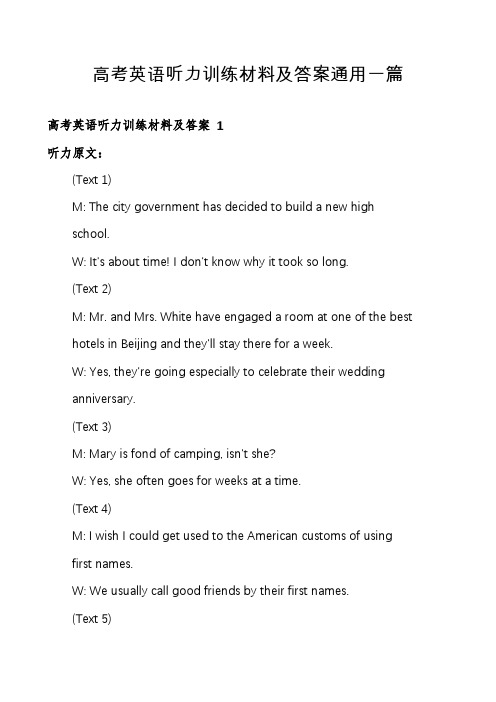
高考英语听力训练材料及答案通用一篇高考英语听力训练材料及答案 1听力原文:(Text 1)M: The city government has decided to build a new highschool.W: It's about time! I don't know why it took so long.(Text 2)M: Mr. and Mrs. White have engaged a room at one of the best hotels in Beijing and they'll stay there for a week.W: Yes, they're going especially to celebrate their weddinganniversary.(Text 3)M: Mary is fond of camping, isn't she?W: Yes, she often goes for weeks at a time.(Text 4)M: I wish I could get used to the American customs of usingfirst names.W: We usually call good friends by their first names.(Text 5)M: Lucy, can you tell me when Linda will get here?W: I'm not sure, but she is supposed to be here at ten to nine. (Text 6)M: Well, Betty, how was your shopping trip with Susan this afternoon?W: Don't ask me.M: What do you mean? Did something go wrong?W: Susan thought I had said I would meet her at the Department Store at 2:30 when I really said 2 o'clock. Then she thought I had said the main entrance in the front when I really said the east entrance.M: Well, did you ever get together?W: Yes, but it's a wonder that we did. I had given up waiting and had gone inside to the women's clothing department. She had done the same thing. We met by accident. By that time it was 3 o'clock.M: Did you get what you wanted? I remember you said you wanted to get a sweater.W: No, a blouse. But by that time, the ones on sales were all gone. So I settled for a skirt.(Text 7)M: Helen, can you tell us a little bit about where you haveworked before?W: Well, my last job was with Format.M: And when did you start to work there?W: Two years ago.M: So why did you decide to leave?W: Well, perhaps you've heard that the pany closed down earlier this year.M: Yes, we've heard about it. And where did you work before Format?W: Ideal Systems.M: How long did you work for them?W: For ten years, as a secretary.M: And why did you leave that job as a secretary?W: Well, I felt I needed a change. I think I learned all I could there.M: OK, that’s enough on your work experiences. You are listed. (Text 8)celebrate it?M: I don’t know. We have no Spring Festival in our country. W: But the Spring Festival is the biggest holiday of the year in our country. People are busy shopping and preparing presents for their relatives and friends before the, New Year’sEve.M: That sounds exciting.W: Children usually put on their new clothes on the first day of the Lunar New Year. And they also can get some moneygiven by the elders as a Lunar New Year gift on the New Year’s Eve.M: It’s really quite interesting.W: And all the family members must e back home on theNew Year’s Eve no matter how far they are away from home. We call it “get__together". What are you going to do on the New Year’s Eve?M: My teacher, Professor Wang and his wife have invited me to have dinner together.W: Sounds great.(Text 9)M: You know that in China all the children should go to school and must finish the primary and junior school. It's the law.W: Yes, I know this quite well. But still there are some children who can't go to school because of their poverty.M: Yes, it’s a matter of money. You see, education here is not pletely free for the students. If it were so it would costthe government too much money.W: Do all parents send their children to state schools?M: Yes, nearly all of them. If you are rich, you may prefer to send your children to private schools, but it takes a lot of money.。
高考听力训练系列(四)[整理]--训练题四材料.doc
![高考听力训练系列(四)[整理]--训练题四材料.doc](https://img.taocdn.com/s3/m/a08e65130975f46526d3e11f.png)
训练题四材料第一节(共5小题;每小题1.5分,满分7. 5分)听下面5段对话。
每段对话后有一道小题,从题中所给的A、B、C三个选项中选出最佳选项,并标在试卷的相应位置。
听完每段对话后,你都有10秒钟的时间来回答有关小题和阅读下一小题。
每段对话仅读一遍。
1.W: Do you think you could fix my television for me today?M: Sorry, Fve got my hands full as it is.2.W: Fm still having trouble getting this door to openM: Sure you have the right key?3.W: Could you tell me the best way to send these books to my friend in Denmark?M: You can send them by special fourth class book rate.4.W: Did you meet the new teacher yesterday?M: Fve been sick for three days.5.W: Can you come to the concert with me this weekend, or do you have to prepare for the exams?M:I still have a lot to do, but maybe a break will do me good.第二节(共15小题;每小题1.5分,满分22. 5分)听下面6段对话或独白。
每段对话或独白后有几道小题,从每题所给的A、B、C二个选项中选出最佳选项。
听每段对话或独白前,你将有5秒钟的时间阅读每小题。
听完后,每小题将给出5秒钟的作答时间。
每段对话或独白你将听两遍。
新高考英语听力模拟训练04原文和答案
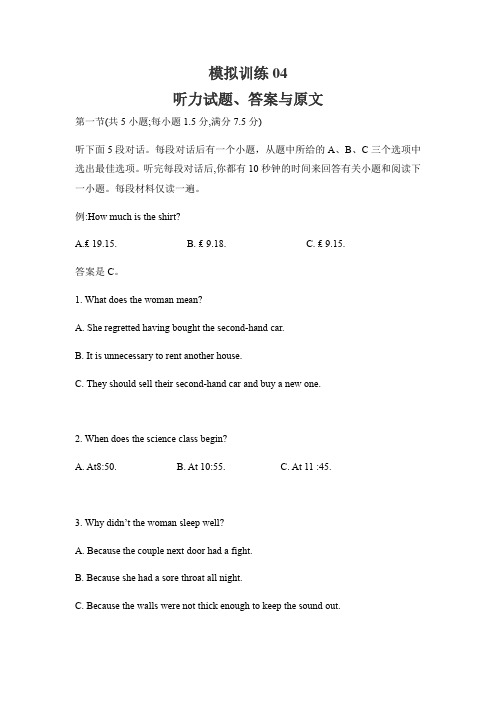
模拟训练04听力试题、答案与原文第一节(共5小题;每小题1.5分,满分7.5分)听下面5段对话。
每段对话后有一个小题,从题中所给的A、B、C三个选项中选出最佳选项。
听完每段对话后,你都有10秒钟的时间来回答有关小题和阅读下一小题。
每段材料仅读一遍。
例:How much is the shirt?A.₤ 19.15.B. ₤ 9.18.C. ₤ 9.15.答案是C。
1. What does the woman mean?A. She regretted having bought the second-hand car.B. It is unnecessary to rent another house.C. They should sell their second-hand car and buy a new one.2. When does the science class begin?A. At8:50.B. At 10:55.C. At 11 :45.3. Why didn’t the woman sleep well?A. Because the couple next door had a fight.B. Because she had a sore throat all night.C. Because the walls were not thick enough to keep the sound out.4. Where does the woman work now?A. In a hotel.B. In a travel agency.C. In a restaurant.5. What does the woman ask the man to do?A. Finish his paper on time.B. Report his problem to the librarian.C. Stop using the computer.第二节(共15小题;每小题1.5分,满分22.5分)听下面5段对话或独白。
高考语文听力试卷
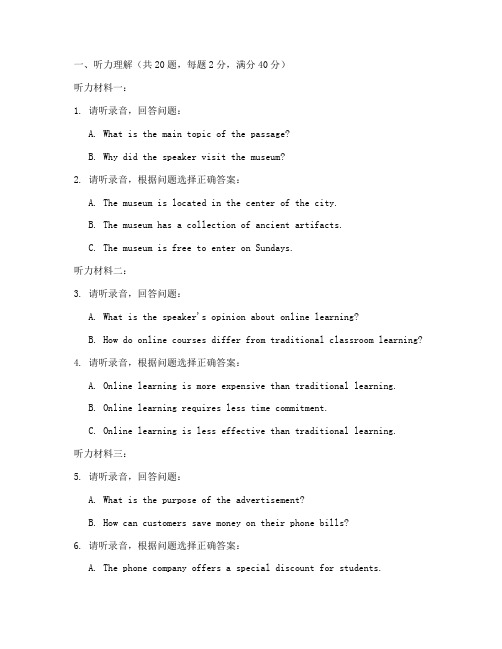
一、听力理解(共20题,每题2分,满分40分)听力材料一:1. 请听录音,回答问题:A. What is the main topic of the passage?B. Why did the speaker visit the museum?2. 请听录音,根据问题选择正确答案:A. The museum is located in the center of the city.B. The museum has a collection of ancient artifacts.C. The museum is free to enter on Sundays.听力材料二:3. 请听录音,回答问题:A. What is the speaker's opinion about online learning?B. How do online courses differ from traditional classroom learning?4. 请听录音,根据问题选择正确答案:A. Online learning is more expensive than traditional learning.B. Online learning requires less time commitment.C. Online learning is less effective than traditional learning.听力材料三:5. 请听录音,回答问题:A. What is the purpose of the advertisement?B. How can customers save money on their phone bills?6. 请听录音,根据问题选择正确答案:A. The phone company offers a special discount for students.B. The phone company provides free data for the first month.C. The phone company offers a family plan discount.听力材料四:7. 请听录音,回答问题:A. What is the main topic of the conversation?B. Why did the woman visit the bookstore?8. 请听录音,根据问题选择正确答案:A. The bookstore has a wide selection of books.B. The bookstore offers a discount for frequent customers.C. The bookstore is closed on weekends.听力材料五:9. 请听录音,回答问题:A. What is the main topic of the passage?B. How can students improve their study habits?10. 请听录音,根据问题选择正确答案:A. Students should study in a quiet place.B. Students should set specific goals for their studies.C. Students should spend more time on social activities.听力材料六:11. 请听录音,回答问题:A. What is the purpose of the announcement?B. When is the next town hall meeting scheduled?12. 请听录音,根据问题选择正确答案:A. The town hall meeting is free and open to the public.B. The town hall meeting will be held at the city hall.C. The town hall meeting will focus on local issues.听力材料七:13. 请听录音,回答问题:A. What is the main topic of the passage?B. How does exercise affect a person's mood?14. 请听录音,根据问题选择正确答案:A. Exercise is more effective than medication for depression.B. Exercise improves mood by releasing endorphins.C. Exercise has no effect on a person's mood.听力材料八:15. 请听录音,回答问题:A. What is the main topic of the conversation?B. Why is the man looking for a new job?16. 请听录音,根据问题选择正确答案:A. The man is dissatisfied with his current job.B. The man is looking for a higher salary.C. The man wants a better work-life balance.听力材料九:17. 请听录音,回答问题:A. What is the purpose of the letter?B. Why does the author want to travel to Japan?18. 请听录音,根据问题选择正确答案:A. The author has never been to Japan.B. The author wants to experience Japanese culture.C. The author is interested in Japanese cuisine.听力材料十:19. 请听录音,回答问题:A. What is the main topic of the passage?B. How can students prepare for their college entrance exams?20. 请听录音,根据问题选择正确答案:A. Students should study every day.B. Students should take breaks during their study sessions.C. Students should rely on their teachers for help.答案:1. A. The main topic of the passage is the museum visit.B. The speaker visited the museum to learn about ancient history.2. B3. A. The speaker's opinion is that online learning is more flexible.B. Online courses are self-paced and can be accessed from anywhere.4. B5. A. The purpose of the advertisement is to promote the phone company's services.B. Customers can save money on their phone bills by choosing a family plan.6. A7. A. The main topic of the conversation is the bookstore.B. The woman visited the bookstore to buy a book for her sister.8. A9. A. The main topic of the passage is study habits.B. Students can improve their study habits by setting specific goals.10. B11. A. The purpose of the announcement is to inform about the town hall meeting.B. The next town hall meeting is scheduled for next Tuesday.12. A13. A. The main topic of the passage is exercise and mood.B. Exercise improves mood by releasing endorphins.14. B15. A. The main topic of the conversation is the man's job search.B. The man is looking for a new job because he is dissatisfied with his current job.16. A17. A. The purpose of the letter is to express the author's desire to travel to Japan.B. The author wants to travel to Japan to experience Japanese culture.18. A19. A. The main topic of the passage is college entrance exams.B. Students can prepare for their college entrance exams by studying every day.20. A(注:本试卷仅供参考,实际考试题目和分值可能有所不同。
2024年新高考英语一轮复习必刷十套卷(卷九)(全解答案)
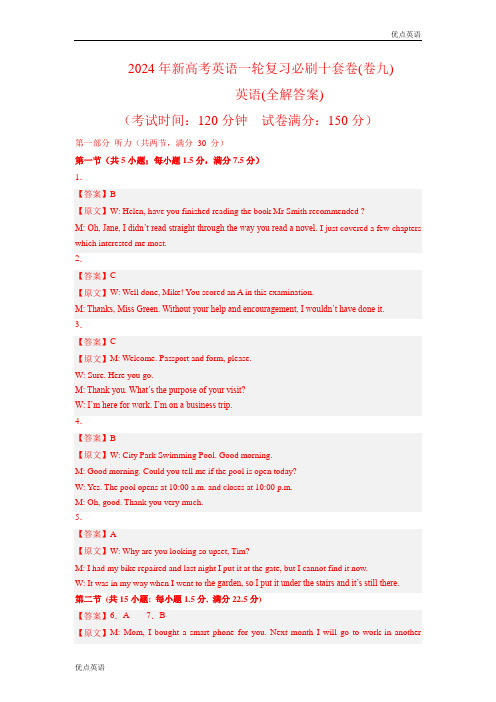
2024年新高考英语一轮复习必刷十套卷(卷九)英语(全解答案)(考试时间:120分钟试卷满分:150分)第一部分听力(共两节,满分30 分)第一节(共5小题;每小题1.5分,满分7.5分)1.【答案】B【原文】W: Helen, have you finished reading the book Mr Smith recommended ?M: Oh, Jane, I didn’t read straight through the way you read a novel. I just covered a few chapters which interested me most.2.【答案】C【原文】W: Well done, Mike! You scored an A in this examination.M: Thanks, Miss Green. Without your help and encouragement, I wouldn’t have done it.3.【答案】C【原文】M: Welcome. Passport and form, please.W: Sure. Here you go.M: Thank you. What’s the purpose of your visit?W: I’m here for work. I’m on a business trip.4.【答案】B【原文】W: City Park Swimming Pool. Good morning.M: Good morning. Could you tell me if the pool is open today?W: Yes. The pool opens at 10:00 a.m. and closes at 10:00 p.m.M: Oh, good. Thank you very much.5.【答案】A【原文】W: Why are you looking so upset, Tim?M: I had my bike repaired and last night I put it at the gate, but I cannot find it now.W: It was in my way when I went to t he garden, so I put it under the stairs and it’s still there.第二节(共15小题: 每小题1.5分, 满分22.5分)【答案】6.A 7.B【原文】M: Mom, I bought a smart phone for you. Next month I will go to work in anothercountry. You can still connect with me on the Internet.W: But I really don’t know how to use it. It’s hard for the old to learn new things.M: It’s OK. I’ll teach you how to have a video chat.W: All right. I will try my best to follow you. It will save a lot of money on phone bills anyway. 【答案】8.C 9.B【原文】W: Good morning. Can I help you?M: Good morning. I’d like to book a single room with a bath.W: I’m afraid the single room has been booked out. How about the double room with a bath?M: That’s OK. How much is the fee per night?W: $70. When will you be arriving and leaving, sir?M: From Monday, October 22nd to Friday, October 26th, for 4 nights.【答案】10.B 11.A 12.C【原文】W: Who are these people dressed in funny costumes?M: That picture was taken when we worked as circus performers in Moscow. On the right is my dad’s cousin Carl and next to him is Carl’s father who owned the circus.W: I can’t believe you were one of those people who do dangerous jumps like that. How long were you in the circus?M: I started when I was a kid about 12. We stayed with the circus for about 10 years. Shortly after we moved the show to Normandy, my older sister broke her leg. Then my parents decided maybe it was time for us to retire. My sister got hurt when she was about 23. I was a year younger at the time and didn’t want to leave.W: That’s too bad she got hurt. Do you still do performances?M: I consult these days. I actually have to travel to India next week to look at the safety equipment of a circus. It will be the first time returning there after my sister got hurt. She lives there managing a hotel.【答案】13.B 14.B 15.B 16.C【原文】W: Hello, everyone. Today, we’ve invited Herbert Wilde to participate in our program. He is a Swiss writer born in Italy, becoming one of Britain’s most popular playwrights. Herbert, can you talk about your burdens as a celebrity?M: Once a person becomes famous, he would pay for it by giving up the freedom to express himself with his own style. He is always living under too much attention without privacy. So I do need a normal and peaceful life.W: I can understand your feelings. Well, if you have a second chance to make a decision, what will you choose, fame or freedom?M: I’ll choose the latter. I want to be the person I want to be, instead of the person others want. And I want to draw my inspiration from the quiet countryside one day.W: I really appreciate your courage to follow your heart. I hope that you can live a happy life and write more good works. But I also hope you can try your best to balance your work and life.【答案】17.C 18.B 19.C 20.A【原文】W: I want a cheeseburger for lunch, and maybe some French fries and a milk shake. M: That’s way too much food, Lucy. I’m going to order something healthy with vegetables.W: Why are you now eating healthier, Russell? Are you trying to lose weight, or do you feel sick? M: I feel fine. I am actually thinking of participating in a race this autumn and I want to be as fit as possible.W: That’s a long time from now. Will changing what you eat actually affect your performance? My brother only eats fried food and he plays soccer all the time without a problem.M: What you eat can change a lot of things, but it also affects everyone differently. Your brother is five years younger than us, so he still can process food quickly. Now that we are older, I really feel different when I eat bad food.W: So because you feel better, you will be able to run much faster? Is it because you will be lighter from eating less?M: It’s more like because I feel better all the time, I am able to work out and tra in for longer. If I train harder, I will be able to get better results and become faster than before.W: Having the energy to do that is important, but I want to enjoy my meal more than anything else.第二部分阅读理解(共两节,满分50分)第一节(共15小题;每小题2.5分,满分37.5分)【答案】21.C 22.A 23.D【导语】本文是一篇应用文。
新高考英语听力模拟训练10原文和答案
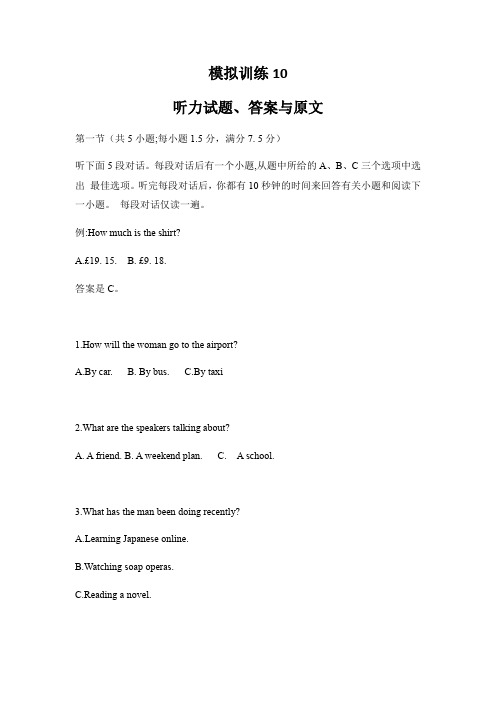
模拟训练10听力试题、答案与原文第一节(共5小题;每小题1.5分,满分7. 5分)听下面5段对话。
每段对话后有一个小题,从题中所给的A、B、C三个选项中选出最佳选项。
听完每段对话后,你都有10秒钟的时间来回答有关小题和阅读下一小题。
每段对话仅读一遍。
例:How much is the shirt?A.£19. 15.B. £9. 18.答案是C。
1.How will the woman go to the airport?A.By car.B. By bus.C.By taxi2.What are the speakers talking about?A. A friend.B. A weekend plan.C. A school.3.What has the man been doing recently?A.Learning Japanese online.B.Watching soap operas.C.Reading a novel.4.Where does this conversation take place?A.At the speakers" home.B.In the woman's office.C.In a restaurant.5.What does the man want to major in at college?A.Medicine.B. Psychology.C. Geography.第二节(共15小题;每小题1. 5分,满分22.5分)听下面5段对话或独白。
每段对话或独白后有几个小题,从题中所给的A、B、C 三个选项中选出最佳选项。
听每段对话或独白前,你将有时间阅读各个小题,每小题5秒钟;听完后,各小题将给出5秒钟的作答时间。
每段对话或独白读两遍。
听第6段材料,回答第6、7题。
6.Why does the man look upset?A.He feels sick.B.He suffers physical pain.C.He lost his favorite player.7.What does the woman think of the man's feeling?A.Understandable.B. Unacceptable.C. Unreasonable听第7段材料,回答第8至10题。
1到10套文章听力-(1)
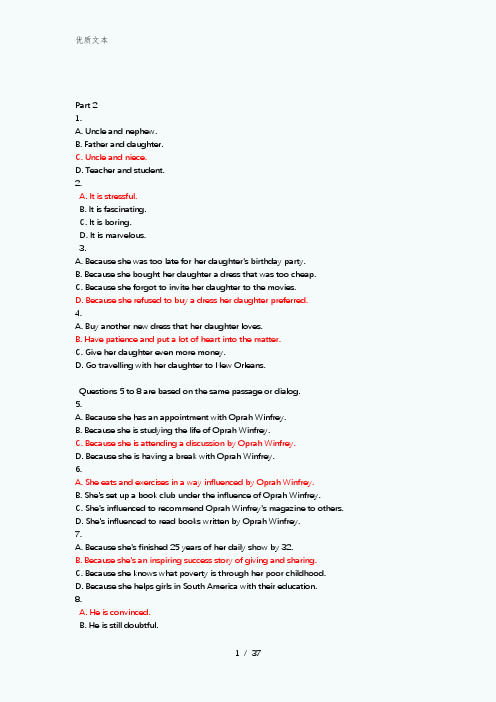
Part 21.A. Uncle and nephew.B. Father and daughter.C. Uncle and niece.D. Teacher and student.2.A. It is stressful.B. It is fascinating.C. It is boring.D. It is marvelous.3.A. Because she was too late for her daughter's birthday party.B. Because she bought her daughter a dress that was too cheap.C. Because she forgot to invite her daughter to the movies.D. Because she refused to buy a dress her daughter preferred.4.A. Buy another new dress that her daughter loves.B. Have patience and put a lot of heart into the matter.C. Give her daughter even more money.D. Go travelling with her daughter to New Orleans.Questions 5 to 8 are based on the same passage or dialog.5.A. Because she has an appointment with Oprah Winfrey.B. Because she is studying the life of Oprah Winfrey.C. Because she is attending a discussion by Oprah Winfrey.D. Because she is having a break with Oprah Winfrey.6.A. She eats and exercises in a way influenced by Oprah Winfrey.B. She's set up a book club under the influence of Oprah Winfrey.C. She's influenced to recommend Oprah Winfrey's magazine to others.D. She's influenced to read books written by Oprah Winfrey.7.A. Because she's finished 25 years of her daily show by 32.B. Because she's an inspiring success story of giving and sharing.C. Because she knows what poverty is through her poor childhood.D. Because she helps girls in South America with their education.8.A. He is convinced.B. He is still doubtful.C. He is impressive.D. He is persuasive.Part 31.A. A house.B. Stocks and shares.C. Their children's education.D. A car.2.A. Supporting themselves when they outlive their husbands by many years.B. Saving more for their children.C. Facing the pressure of divorce during old age period.D. Taking care of their husbands when they are elderly.3.A. By investing more savings in stocks and shares.B. By being more dependent on others' advice.C. By getting themselves properly informed.D. By looking ahead and thinking ahead.4.A. Women need to save enough money for buying cars.B. Women need to learn to prepare financially for their old age.C. Women need to learn more economic skills.D. Women need to have an independent retirement.Questions 5 to 8 are based on the same passage or dialog.5.A. 11 male students and seven female students.B. Seven male students and 11 female students.C. 18 male students and 11 female students.D. Seven male students and 18 female students.6.A. Question number five.B. Question number four.C. Question number three.D. Question number two.7. A. Most people favor 26-30 as the ideal age to get married to an attractive partner and have two children.B. Most people favor 21-25 as the ideal age to get married to an attractive partner and have two children.C. Most people favor 26-30 as the ideal age to get married to an intelligent partner and have two children.D. Most people favor 21-25 as the ideal age to get married to an intelligent partner and have two children.8.A. There are not equal numbers of males and females.B. The survey was based upon a very small sample.C. The questionnaire doesn't include enough questions.D. The students didn't give exact answers to the questions.Part 2 Long Conversations(每题:3 分)Directions: In this section, you will hear some long conversations. At the end of each conversation, some questions will be asked about what was said. Both the conversation and the questions will be spoken only once. After each question there will be a pause. During the pause, you must read the four choices marked A, B, C, and D, and decide which the best answer is.Questions 1 to 4 are based on the same passage or dialog.1.A. Because he is too anxious to show himself for an interview.B. Because he is too sure of his intelligence and concentration.C. Because he is interrupted by the woman yelling at him.D. Because he is worried for limited years of experience.2.A. He has only 50,000 dollars.B. He has just paid off his debt.C. He is in great need of money.D. He is in debt for his new house.3.A. They continued to work together in a small cafe.B. They went out after their third day of work together.C. They talked for two hours in a small cafe.D. They found out that they had the same dream.4.A. Pessimistic.B. Doubtful.C. Encouraging.D. Indifferent.Questions 5 to 8 are based on the same passage or dialog.5.A. He picked up the engagement ring from Tiffany's on 6th Avenue.B. He took Molly to his favorite place for an early dinner.C. He took Molly to their favorite place in Central Park.D. He said something wrong like "bury me" or "scary me".6.A. Because he was too frustrated.B. Because he was too nervous.C. Because he was too crazy.D. Because he was too scared.7.A. Molly took out a flash light and found the ring.B. Nathan took out a flash light and found the ring.C. Molly finally found the ring in her purse.D. Nathan finally found the ring in the box.8.A. She was careless and didn't care to marry Nathan.B. She was considerate and happy to marry Nathan.C. She was indifferent to Nathan's proposal.D. She was prepared to marry Nathan without a ring.Part 3 Passage(每题:4 分)Directions: In this section, you'll hear some short passages. At the end of each passage, you will hear some questions. Both the passage and the questions will be spoken only once. After you hear a question, you must choose the best answer from the four choices marked A, B, C, and D.Questions 1 to 4 are based on the same passage or dialog.1.A. The feelings of peace, love and goodwill during holiday seasons.B. The feelings of stress, fatigue and pressure during holiday seasons.C. The feelings of physical confusion during holiday seasons.D. The feelings of seasonal disorder that comes from holiday seasons.2.A. Shopping and decorating.B. Cooking at late night.C. Winter's shorter nights.D. Doing spiritual tasks.3.A. Family reunions becoming too frequent.B. The eagerness to have more family gatherings.C. Families becoming much more complex.D. The anxiety to help families without jobs or in debts.4.A. By arranging family reunions more frequently.B. By accepting the feelings and trying to deal with them.C. By denying that there are any feelings of holiday blues.D. By doing things such as exercises to satisfy other people. Questions 5 to 8 are based on the same passage or dialog.5.A. Parents are out of touch with their children's daily life.B. Parents can't understand their children's sense of humor.C. Parents rarely talk about certain problems with their children.D. Parents don't trust their children to tackle any problems.6.A. Because they want to prove themselves superior in style and taste.B. Because they choose to be different from their parents.C. Because they want to make their parents appreciate them.D. Because they want to make them leaders of their parents.7.A. Because they don't want to betray the adult world.B. Because they want to be responsible for themselves.C. Because they don't care about being taken as losers.D. Because they are completely under parents' control.8.A. Be obedient.B. Be charming.C. Be co-operative.D. Be impressive.33333333333Part 2 Long Conversations(每题:3 分)Directions: In this section, you will hear some long conversations. At the end of each conversation, some questions will be asked about what was said. Both the conversation and the questions will be spoken only once. After each question there will be a pause. During the pause, you must read the four choices marked A, B, C, and D, and decide which the best answer is.Questions 1 to 4 are based on the same passage or dialog.1.A. Relaxing on his porch with his dog.B. Reading a book in his hand at home.C. Cleaning in the swimming pool downstairs.D. Planting flowers in the community garden.2.A. By planting special flowers to drive away annoying insects.B. By planting fruits and vegetables in the garden.C. By spraying poison on the plants to kill damaging insects.D. By often weeding and watering the plants in the garden.3.A. It's a garden for people to relax in after swimming.B. It's a bit far from the apartment where the woman lives.C. Flowers, fruits and vegetables can be planted in the garden.D. Flowers are planted in the garden and sold in the store.4.A. Buy flowers from the store.B. Visit the garden with the man.C. Plant organic potatoes.D. Grow some strawberries.Questions 5 to 8 are based on the same passage or dialog.5.A. To make friends with the man.B. To invite him go out golfing.C. To play online video games together.D. To introduce new friends to him.6.A. Because he was busy with his chemistry class.B. Because he was too busy going out to meet people.C. Because he had to meet friends from high school.D. Because he thought it was not to his liking.7.A. Someone promised to bake cookies at the party.B. The black-haired girl Miranda was going to the party.C. A video game competition would be held at the party.D. Home-baked cookies would be available at the party.8.A. 5.B. 8.C. 3.D. 6.Part 3 Passage(每题:4 分)Directions: In this section, you'll hear some short passages. At the end of each passage, you will hear some questions. Both the passage and the questions will be spoken only once. After you hear a question, you must choose the best answer from the four choices marked A, B, C, and D.Questions 1 to 4 are based on the same passage or dialog.1.A. When they are scared by someone.B. Right before they give a speech.C. When they feel upset at something.D. Right before they are attacked.2.A. The ability to sense tense situations.B. The ability to either fight or flee.C. The ability to behave yourself.D. The ability to avoid confusion.3.A. Because the "fight or flight" responses kick in at the wrong time.B. Because heart rate increases and breathing becomes shallow.C. Because you feel that you are really in dangerous situations.D. Because you feel confused and scared from the situations.4.A. By taking anti-depression medication.B. By staying away from panic attacks.C. By taking heart for your situation and no worry.D. By keeping your heart rate down.Questions 5 to 8 are based on the same passage or dialog.5.A. The two-parent British family is dominant.B. People have children after they get married.C. Only married people are living together.D. The number of one parent family has increased.6.A. The British have changed their views on marriage.B. Getting married young is socially unacceptable in Britain.C. Getting married costs a lot and takes time in Britain.D. Divorce was very difficult and not acceptable in Britain.7.A. 18 percent.B. 29 percentC. 40 percent.D. 60 percent.8.A. Because they are too young when they get married.B. Because they need more time to concentrate on their career.C. Because they prefer to have more time for fun.D. Because it is socially acceptable in Britain.Part 2 Long Conversations(每题:4 分)Directions: In this section, you will hear some long conversations. At the end of each conversation, some questions will be asked about what was said. Both the conversation andthe questions will be spoken only once. After each question there will be a pause. During the pause, you must read the four choices marked A, B, C, and D, and decide which the best answer is.Questions 1 to 4 are based on the same passage or dialog.1.A. Because he wants to tell the shipping company in California to cancel the delivery.B. Because he wants to ask the shipping company on the west coast for compensation.C. Because he wants to ask the shipping company on the east coast to buy their textbooks.D. Because he wants to look for a shipping company to deliver the goods in time.2.A. She feels impossible to ship their good to Korea in three weeks.B. She feels that she can do nothing since no shipping company was available.C. She is cool-headed though she realized that it was a tough problem.D. She feels that they could accept the harsh fact.3.A. He owns a company in Seoul making bowling balls.B. He is Mrs. McCoy's friend, playing bowling in Detroit.C. He will travel to Seoul on the first of next month.D. He has a company that ships to Seoul every month.4.A. They will be delivered to Seoul in time.B. They will be stored in the backyard.C. They will be traded for bowling balls.D. They will be sold at a lower price.Questions 5 to 6 are based on the same passage or dialog.5.A. To improve the boring class by teaching the design of cars.B. To draw the students' interest towards the Grand Prix race.C. To have an international pizza party.D. To have a class trip to the Grand Prix race6.A. Because he wants to ask some questions about gravity.B. Because he wants to talk about the trip in detail.C. Because he wants to appeal to emotions for the trip.D. Because he wants to show a poster of a red race car.Part 3 Passage(每题:4 分)Directions: In this section, you'll hear some short passages. At the end of each passage, you will hear some questions. Both the passage and the questions will be spoken only once. After you hear a question, you must choose the best answer from the four choices marked A, B, C, and D.Questions 1 to 4 are based on the same passage or dialog.1.A. Decline in economy.B. Decline in graduates.C. Increase in graduates.D. Increase in graduate schools.2.A. A) Twenty-three percent.B. Twenty-two percent.C. Twenty-seven percent.D. Twenty-four percent.3.A. It can fill out job application forms for students.B. It can help students complete an internship.C. It can provide job information for students.D. It can help second-year students decide what to study.4.A. A) Graduates are not paid for an internship.B. Accounting graduates are unlikely to get a job.C. Engineering graduates are likely to get a well-paid job.D. Graduates will be assured of a job after an internship. Questions 5 to 8 are based on the same passage or dialog.5.A. Standards of education are falling.B. Social expectations on students are rising too quickly.C. The tuition fees are always rising rapidly.D. The reading, writing, and arithmetic are overemphasized.6.A. 27 percent.B. 16 percent.C. 13 percent.D. 50 percent.7.A. Too many students in school.B. The negative influence of television.C. Lack of strict discipline.D. Less attention to art and drama.8.A. More acceptable with students.B. Higher tuition fee and better return.C. Smaller classes and stricter discipline.D. More practical subjects available.Part 2 Long Conversations(每题:3 分)Directions: In this section, you will hear some long conversations. At the end of each conversation, some questions will be asked about what was said. Both the conversation and the questions will be spoken only once. After each question there will be a pause. During the pause, you must read the four choices marked A, B, C, and D, and decide which the best answer is.Questions 1 to 4 are based on the same passage or dialog.1.A. At 9:00 AMB. At 8:50 AMC. At 8:20 AMD. At 8:40 AM2.A. She arrived at her shop about 40 minutes earlier than others.B. She recruited quite a lot new employees for her business.C. She started her business two years before at a good business location.D. She doubled her business since Microsoft has a building next to her shop.3.A. Because she didn't want to eat anything for lunch at all.B. Because she was too much of a girl, pretty quiet and really sweet.C. Because she was too nice to embarrass Derek for his choice of restaurant.D. Because she has no other choices in the hamburger place.4.A. It turned out to be fine despite some embarrassment.B. It began with unpleasantness and ended even worse.C. It turned out to be the greatest day of his life.D. It started with some excitement and expectations.Questions 5 to 8 are based on the same passage or dialog.5.A. Expressing his admiration for an Airline company.B. Reporting his internship to one of the company bosses.C. Showing how much he liked the interning in the company.D. Meeting face-to-face with one of the company bosses.6.A. She's about to take a new position to coordinate publicity requirements.B. She will be promoted to a new position in Human Resources.C. She's another intern who has got an offer in the company.D. She's an advisor to Barbara, one of the company bosses.7.A. A position in Human Resources.B. A job in Marketing Support.C. A job taking care of the interviews with the media.D. A job to study the business model in the company.8.A. Accepted the offer without any hesitation.B. Accepted the offer with some reservation.C. Took it as a chance for his internship.D. Took it merely as a dream that cannot be true.Part 3 Passage(每题:4 分)Directions: In this section, you'll hear some short passages. At the end of each passage, you will hear some questions. Both the passage and the questions will be spoken only once. After you hear a question, you must choose the best answer from the four choices marked A, B, C, and D.Questions 1 to 4 are based on the same passage or dialog.1.A. Their overnight success is considered to be attributed to luck.B. Their overnight success is thought to have come from personal relationships.C. They are perceived to have less integrity than unattractive ones.D. They are considered to have a positive factor on the way up the career ladder.2.A. Their attractiveness is a positive factor in their career development.B. Their success is often attributed more to luck than to their ability.C. They are considered to have more integrity than unattractive women.D. They have a disadvantage in traditionally female jobs.3.A. In the political circle.B. In the executive circle.C. In traditionally masculine positions.D. In traditionally female jobs.4.A. A) Unattractive male candidates received the most votes.B. Unattractive female candidates defeated the unattractive male candidates in votes.C. Attractive female candidates defeated attractive male candidates in votes.D. Attractive female candidates received the fewest votes.Questions 5 to 8 are based on the same passage or dialog.5.A. The International Mars Society.B. Inspiration Mars Foundation.C. Ames Research Center in California.D. American state of Colorado.6.A. A space craft would carry two men to Mars.B. The crew members would be all Americans.C. America is responsible for getting the craft to Mars.D. University students would design the flight operation.7.A. Mainly students.B. Mainly professors.C. University alumni and professors.D. Professors and students.8.A. He is just a businessman.B. He loves touring around the world.C. He belongs to the Inspiration Mars Foundation.D. He invented the idea of the competition.6666666666Part 2 Long Conversations(每题:3 分)Directions: In this section, you will hear some long conversations. At the end of each conversation, some questions will be asked about what was said. Both the conversation and the questions will be spoken only once. After each question there will be a pause. During the pause, you must read the four choices marked A, B, C, and D, and decide which the best answer is.Questions 1 to 4 are based on the same passage or dialog.1.A. It's about the famous flight over the Atlantic Ocean by Amelia Earhart.B. It's based on facts how Amelia Earhart disappeared in 1937 flight.C. It is impressive as it goes deeper into Amelia Earhart's story.D. It collects more facts about Amelia Earhart than others' reports.2.A. She sacrificed her victory and helped save a fellow pilot in the race.B. She won the first place in 1929 race flight by landing earlier than others.C. She won the first place in 1929 race flight though she was not the first to land.D. She sacrificed her life to save another pilot in 1929 race flight.3.A. Professor Smith's interesting lecture.B. The influence of her family.C. The sacrifice made by Amelia Earhart.D. The story her mother told her about Amelia Earhart.4.A. History is a series of interconnected events.B. History is a story of important people and events.C. History is as a web in which every war leads to new inventions.D. History is fascinating and could be very impersonal.Questions 5 to 8 are based on the same passage or dialog.5.A. Moving to California.B. Finishing her research paper.C. Finding scandals from history.D. Studying her family history.6.A. From Ireland.B. From Texas.C. From California.D. From Colorado.7.A. A long-lasting war.B. A great crop failure.C. A widely-spread disease.D. A family scandal.8.A. Organize a family reunion.B. Visit all their relatives.C. Pay a visit to their aunt.D. Plant a family tree.Part 3 Passage(每题:4 分)Directions: In this section, you'll hear some short passages. At the end of each passage, you will hear some questions. Both the passage and the questions will be spoken only once. After you hear a question, you must choose the best answer from the four choices marked A, B, C, and D.Questions 1 to 4 are based on the same passage or dialog.1.A. About successive waves of immigrants arriving in the city.B. About its original city name New Amsterdam.C. About how Germans conquered the city.D. About the war of independence at the time.2.A. For conquest.B. For immigration.C. For a better life.D. For independence.3.A. Because they were American citizens and have the right to live there.B. Because they arrived before laws were passed to limit immigration.C. Because they did not come in large numbers.D. Because they were American blacks.4.A. With earlier immigrants who spoke English better.B. With earlier settlers from their former country.C. With Americans of other nationalities.D. With earlier settlers of British origin.Questions 5 to 8 are based on the same passage or dialog.5.A. Snow can cause thousands of deaths in the United States every year.B. Snow can be very dangerous although it is beautiful.C. Snow can lead to many people's heart attack in the United States.D. Snow can make it more difficult to do physical activity in winter.6.A. Avoid living in areas where it snows often.B. Stay inside the house until the winter ends.C. Do physical activity by removing the snow around the house.D. Keep sufficient supplies in the home before the snow storm.7.A. Turn off the engine to save fuel for emergency.B. Shut the vehicle windows to keep it warm inside waiting for rescue.C. Put a bright-colored object on top of the vehicle asking for help.D. Clear the exhaust pipe every ten or fifteen minutes.8.A. Food, medicine and clothing.B. Food, medicine and clean water.C. Clothing, clean water and extra power supplies.D. Medicine, clean water and clothing.77777777777Part 2 Long Conversations(每题:3 分)Directions: In this section, you will hear some long conversations. At the end of each conversation, some questions will be asked about what was said. Both the conversation and the questions will be spoken only once. After each question there will be a pause. During the pause, you must read the four choices marked A, B, C, and D, and decide which the best answer is.Questions 1 to 4 are based on the same passage or dialog.1.A. It is hard and tiresome for her to fly 14 hours from Dallas to Copenhagen.B. It is not credible to travel for three weeks in a boat to Copenhagen.C. She is not much convinced that flying is much easier than ocean crossing.D. She is so fed up with long hours of flying that she would not do that again.2.A. Take the voyage to America.B. Travel to Ireland.C. Stay where she were.D. Visit her ancestors.3.A. She is very excited.B. She feels frustrated.C. She thinks it unbelievable.D. She thinks it quite possible.4.A. It's only the man's dream.B. It's under construction.C. It's introduced on TV.D. It's carrying people to Mars.Questions 5 to 8 are based on the same passage or dialog.5.A. Because Frank did not let the man sleep at night.B. Because Frank did not do the cleaning in the dorm.C. Because Frank was out partying all the time.D. Because Frank had crazy loud parties in the dorm all night.6.A. He could not reach a high GPA.B. He was declined by a university club.C. He failed his classes this year.D. He lost one of his best friends.7.A. Ignore the failure in the exam.B. Make a compromise with Frank.C. Stop the partying in the dorm.D. Move out the dorm at once.8.A. Because the woman taught him the correct attitude to deal with problems.B. Because the woman looked at the problem from some different angles.C. Because the woman stopped his roommate to have parties in the dorm.D. Because the woman told him to give up on his friend in such a situation.Part 3 Passage(每题:4 分)Directions: In this section, you'll hear some short passages. At the end of each passage, you will hear some questions. Both the passage and the questions will be spoken only once. After you hear a question, you must choose the best answer from the four choices marked A, B, C, and D.Questions 1 to 4 are based on the same passage or dialog.1.A. 32 percent of graduates.B. 24 percent of graduates.C. Two in five of graduates.D. A third of graduates.2.A. Work-life balance.B. Rapid career progression.C. Management and leadership.D. High salary and status.3.A. More than half of them are hugely ambitious and will get a promotion rapidly.B. One in ten will be promoted to a management position a year into their first job.C. Most of them do not expect to stay working within their current organization.D. Most of them do not have a chance of rapid career progression.4.A. Because they believe they are more ambitious than their bosses.B. Because they believe they are more efficient than their bosses.C. Because they believe their education will assure them of a quick promotion.D. Because they believe their can-do attitude can earn them their advancement in career. Questions 5 to 8 are based on the same passage or dialog.5.。
04-备考2025年新高考英语听力训练(全国卷含解析
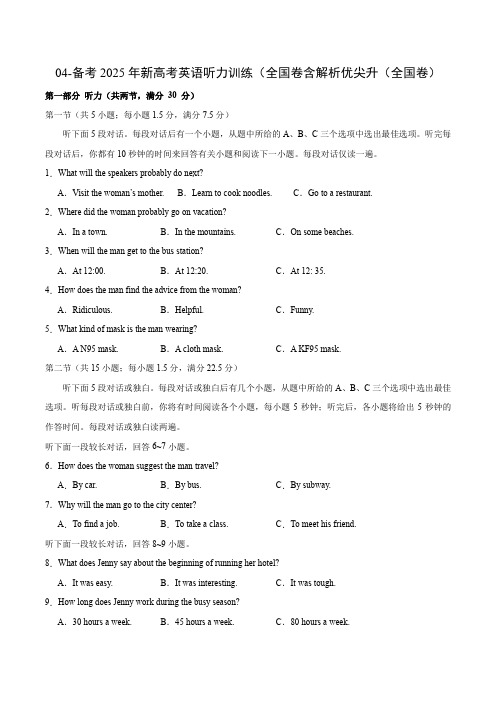
04-备考2025年新高考英语听力训练(全国卷含解析优尖升(全国卷)第一部分听力(共两节,满分30 分)第一节(共5小题;每小题1.5分,满分7.5分)听下面5段对话。
每段对话后有一个小题,从题中所给的A、B、C三个选项中选出最佳选项。
听完每段对话后,你都有10秒钟的时间来回答有关小题和阅读下一小题。
每段对话仅读一遍。
1.What will the speakers probably do next?A.Visit the woman’s mother. B.Learn to cook noodles.C.Go to a restaurant.2.Where did the woman probably go on vacation?A.In a town.B.In the mountains.C.On some beaches.3.When will the man get to the bus station?A.At 12:00.B.At 12:20.C.At 12: 35.4.How does the man find the advice from the woman?A.Ridiculous.B.Helpful.C.Funny.5.What kind of mask is the man wearing?A.A N95 mask.B.A cloth mask.C.A KF95 mask.第二节(共15小题;每小题1.5分,满分22.5分)听下面5段对话或独白。
每段对话或独白后有几个小题,从题中所给的A、B、C三个选项中选出最佳选项。
听每段对话或独白前,你将有时间阅读各个小题,每小题5秒钟;听完后,各小题将给出5秒钟的作答时间。
每段对话或独白读两遍。
听下面一段较长对话,回答6~7小题。
6.How does the woman suggest the man travel?A.By car.B.By bus.C.By subway.7.Why will the man go to the city center?A.To find a job.B.To take a class.C.To meet his friend.听下面一段较长对话,回答8~9小题。
英语:高考听力模拟试题(4)听力材料及答案.doc
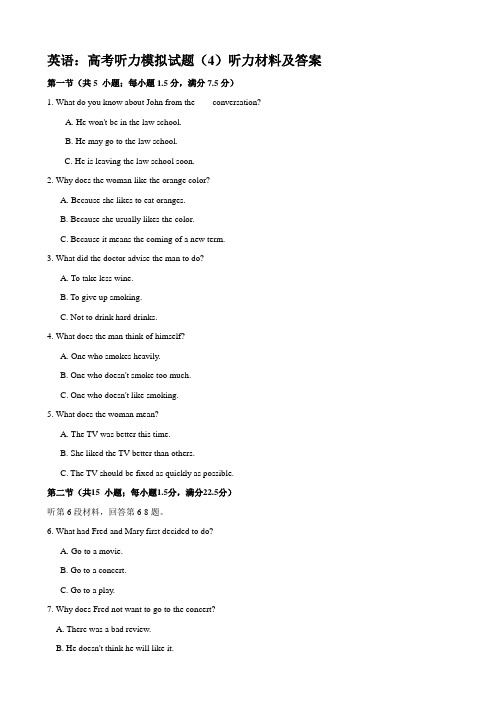
英语:高考听力模拟试题(4)听力材料及答案第一节(共5 小题;每小题1.5分,满分7.5分)1. What do you know about John from the conversation?A. He won't be in the law school.B. He may go to the law school.C. He is leaving the law school soon.2. Why does the woman like the orange color?A. Because she likes to eat oranges.B. Because she usually likes the color.C. Because it means the coming of a new term.3. What did the doctor advise the man to do?A. To take less wine.B. To give up smoking.C. Not to drink hard drinks.4. What does the man think of himself?A. One who smokes heavily.B. One who doesn't smoke too much.C. One who doesn't like smoking.5. What does the woman mean?A. The TV was better this time.B. She liked the TV better than others.C. The TV should be fixed as quickly as possible.第二节(共15 小题;每小题1.5分,满分22.5分)听第6段材料,回答第6-8题。
6. What had Fred and Mary first decided to do?A. Go to a movie.B. Go to a concert.C. Go to a play.7. Why does Fred not want to go to the concert?A. There was a bad review.C. Tickets are hard to get.8. When do Mary and Fred agree to meet?A. At 8:30.B. At 7:30.C. At 7:00.听第7段材料,回答第9-11题。
四级10套听力强化练习 听力原文
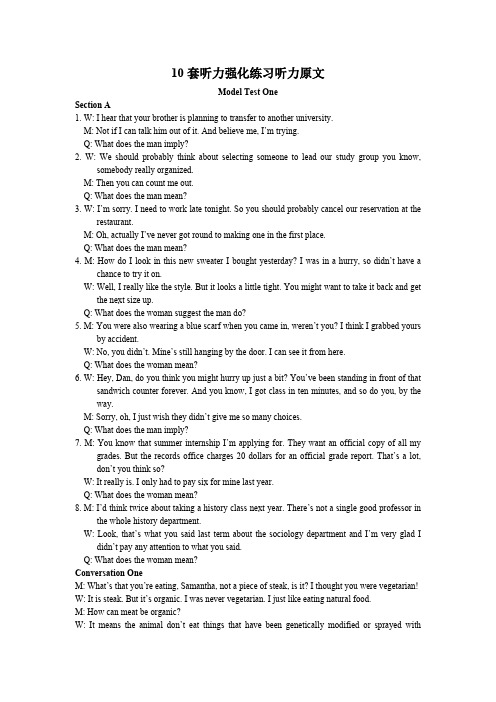
10套听力强化练习听力原文Model Test OneSection A1. W: I hear that your brother is planning to transfer to another university.M: Not if I can talk him out of it. And believe me, I’m trying.Q: What does the man imply?2. W: We should probably think about selecting someone to lead our study group you know,somebody really organized.M: Then you can count me out.Q: What does the man mean?3. W: I’m sorry. I need to work late tonight. So you should probably cancel our reservation at therestaurant.M: Oh, actually I’ve never got round to making one in the first place.Q: What does the man mean?4. M: How do I look in this new sweater I bought yesterday? I was in a hurry, so didn’t have achance to try it on.W: Well, I really like the style. But it looks a little tight. You might want to take it back and get the next size up.Q: What does the woman suggest the man do?5. M: You were also wearing a blue scarf when you came in, weren’t you? I think I grabbed yoursby accident.W: No, you didn’t. Mine’s still hanging by the door. I can see it from here.Q: What does the woman mean?6. W: Hey, Dan, do you think you might hurry up just a bit? You’ve been standing in front of thatsandwich counter forever. And you know, I got class in ten minutes, and so do you, by the way.M: Sorry, oh, I just wish they didn’t give me so many choices.Q: What does the man imply?7. M: You know that summer internship I’m applying for. They want an official copy of all mygrades. But the records office charges 20 dollars for an official grade report. That’s a lot, don’t you think so?W: It really is. I only had to pay six for mine last year.Q: What does the woman mean?8. M: I’d think twice about taking a history class next year. There’s not a single good professor inthe whole history department.W: Look, that’s what you said last term about the sociology department and I’m very glad I didn’t pay any attention to what you said.Q: What does the woman mean?Conversation OneM: What’s that you’re eating, Samantha, not a piece of steak, is it? I thought you were vegetarian! W: It is steak. But it’s organic. I was never vegetarian. I just like eating natural food.M: How can meat be organic?W: It means the animal don’t eat things that have been genetically modified or sprayed withpesticides.M: And I suppose it has had a good time walking around the fields, not shut inside all its life.W: That’s right.M: But can you taste the difference?W: I think so. Anyway, I’m not filling myself with all sorts of chemicals that might give me cancer.M: Yes, but there’s no proof that pesticides give you cancer.W: So why do the scientists who monitor these things prefer to eat organic food too? Pesticides are only tested on animals. Companies don’t have to spend millions on trials with human volunteers. Small quantities of chemicals do get into your food.M: Some food. Look, if the newspapers found a company was deliberately selling an unsafe product, their share price would crash and they’d be out of business in no time.W: They may go out of business soon if they don’t start selling organic food themselves. They say sales of organic food have risen by 25%.M: It’s still more expensive. You’ve got to compare the price, which is at least double, with the risk you’re running, which is absolutely minimal if you ask me.W: Well, this is prime organic beef from the Scottish Highlands. So if you don’t mind, I’d like to finish my lunch!9. Q: What can we learn about the woman’s eating habit?10. Q: What is said about organic animals?11. Q: How do companies test pesticides?12. Q: What is the man’s opinion on organic food’s price?Conversation TwoW: Professor Bevan, how important is motivation for a manager?M: Oh, motivation is extremely important. I’d say it’s the most important aspect of a manager’s job. A manager’s job is to get the job done. So he has to motivate the workers—as a team and also on an individual basis.W: So how do managers go about doing this? It doesn’t sound very easy.M: No, it is a complicated issue. But managers have special tools. They are trained to use them to boost motivation and increase production to a maximum.W: Tools?M: Yes, such as praise, approval, recognition, trust and expectation.W: And money? What about money?M: Yes, money is a factor but you might be surprised to learn that it comes out last on the list of these tools.W: What are more important for workers?M: Well, all of the things that I have already mentioned, and then job enrichment and good communication.W: And have you got any examples of real life situations to back up your claims?M: One good example is the firm Western Electric. When managers started to talk to the workers and encouraged them to get involved in decision making, workers began to feel that their contributions were important. And it paid off.W: Productivity increased?M: Yes, hugely.W: So, let’s get this straight. Are you saying that workers are not interested in earning more money?M: I’m saying they’re not just interested in money. There are other things that are just as important.13. Q: What is extremely important for a manager to do?14. Q: What does the man think of money?15. Q: In what way did motivation work in the example of Western Electric?Section BPassage OneHave you ever heard of tobacco toothpaste? That’s just one of many tobacco products that are popular in India, the world’s second most populous nation. Cigarettes are the most widely used form of tobacco, of course, but Indians also are fond of a wide selection of smokeless, chewable varieties—despite the fact that India has the world’s highest rate of tobacco-related diseases such as cancer and emphysema. Because many children and adolescents chew tobacco from morning till night, the incidence of mouth cancer has skyrocketed.Leading a campaign to warn India’s youth of the dangers of tobacco is Ruby Bhatia, who gives many speeches and television interviews. Bhatia was born in Alabama, grew up in Canada, and majored in philosophy at the University of Toronto. She moved to India a few years ago, already fluent in Hindi and English (two of India’s major languages), and quickly became one of India’s most popular TV talk-show hosts.Bhatia says that her TV experience helps her create anti-tobacco speeches that are short and persuasive. “If you give a lot of ideas that are only loosely tied together, you won’t win your case. Your ideas must have a logical sequence.” TV reports—which she says are a good model for public speakers to follow—often use a chronological, story-telling pattern or a problem-solution pattern.16. Q: What’s the result of many Indian children’s chewing tobacco from morning till night?17. Q: What contributed to Ruby Bhatia’s becoming one of India’s most popular TV talk-showhosts?18. Q: What suggestions did Bhatia give in creating speeches?Passage TwoFor many years now we have been referring to English as a global language. Everybody seems to be learning English and it isn’t uncommon to see English being used as a means of communication between, let’s say, a German and an Italian. Very soon English will be the second language of all the people in the world.We can see evidence of changes in this all the time. Let’s take the Eurovision Song Contest as an example. Whatever we might think of the contest itself, one thing that has changed recently is that now countries can opt to sing in English. In the last festival fourteen of the twenty five competing countries asked for the rules to be changed to allow them to sing in English. They argued that singing in their own language would put them at a disadvantage.And what exactly does all of this mean for native speakers of English? Well, we are already in a minority. In the future, majority speakers—that are non-native English speakers—might outnumber native English speakers by four to one. The two most important Englishes won’t be British English and American English. They’ll be Native English and Majority English. So native English speakers will be the only people in the world who speak just one language. Because therewon’t be much of a reason for native English speakers to learn a second language. As more and more people speak English, it makes sense that they will become more competent. It’s us, not the Majority English speakers, will be the disadvantaged.19. Q: What kind of people are often seen communicating in English as mentioned by the speaker?20. Q: Why did many competing countries ask to be allowed to sing in English in the contest?21. Q: What is the speaker concerned about the most?Passage ThreeAt the beginning of a speech, student speaker Kathie Aquila posed a question: “On what form of entertainment do Americans spend the greatest amount of money? I’ll give you some hints. It’s not recorded music, nor sports events, nor rock concerts, nor theme parks.”Then she revealed the answer: legalized gambling, on which Americans each year spend $340 billion—more money than they spend on all other forms of entertainment combined. In the body of the speech, Aquila tried to persuade her audience that gambling is a waste of money and time. Then she closed the speech with a quotation by Mark Twain: “‘There are two times in your life when you should not gamble: when you can’t afford it and when you can.’”Aquila’s speech was lively and impressive, partly because she used an interesting introduction and a memorable conclusion.Some speakers make no plans for the beginning and end of a speech, preferring to wait until speech time to let the mood of the moment determine what they say. This strategy is a mistake. If you don’t have a lively introduction, you can lose your audience. “People have remote controls in their heads today,” says Myrna Marofsky, a business executive. “If you don’t catch their interest, they just click you off.” And a conclusion that is weak or clumsy can damage the effectiveness of what otherwise might have been a good speech.Since the introduction and conclusion are extremely important, devote as much time and energy to them as you give to the body of the speech.22. Q: What did Aquila do at the beginning of her speech?23. Q: How did Aquila conclude her speech?24. Q: What mistake do some speakers make when they prepare a speech?25. Q: What does the speaker suggest speechmakers do at the end of the passage?Model Test TwoSection A1. M: I’ve been running a mile every afternoon for the past month. But I still haven’t been able tolose more than a pound or two. I wonder if this is worth it.W: Oh, don’t give up now. It always seems hard when you just start out.Q: What does the woman mean?2. W: I just found out the registration of the creative writing class was full. Now I have to waitanother whole year to get in.M: Why don’t you check back after the first week? Somebody might drop it.Q: What does the man suggest the woman do?3. W: John, I really can’t afford any more interruptions right now. I’ve got to finish thisassignment.M: I’m sorry Cathy. Just one more thing, I forgot to ask you if you could give me a ride to school tomorrow.Q: What can be inferred about the man?4. M: Excuse me? Could you direct me to Customer Service? I need to have this gift wrapped. W: We can take care of that right here sir, and no charge. You can choose either silver or gold with the matching bow.Q: What will the man probably do next?5. W: Oh, no! I just picked up the pictures I took at Dan and Linda’s wedding and looked at themand none of them came out.M: They are dark, aren’t they? What a shame. Oh, well, I’m sure the professional photographer got everything.Q: What does the man mean?6. M: I have to give an oral presentation in history next week. I’m really nervous about speakingin front of everyone.W: Try making a tape of yourself while you practise. That might help you feel more comfortable.Q: What does the woman suggest the man do?7. W: I’m amazed that you are still driving that old car of yours. I thought you would have gottenrid of it years ago.M: It runs well and I’ve actually grown quite attached to it.Q: What does the man mean?8. M: I was going to get something to eat at the cafeteria, but it seems to be closed.W: Oh, that’s because it’s Sunday. Why don’t you come with me to a place I know on Canal Street?Q: What does the woman suggest they do?Conversation OneM: Hi, Sis. I just came over to drop off the DVDs you wanted. Wow!? Where did you get all of this stuff?W: I bought it. So, what do you think of my new entertainment center? The widescreen TV and new DVD player.M: But where did you get the money to buy all this? You didn’t borrow money from mom and dad again, did you?W: Of course not. I got it with this! It’s a student credit card.M: A student credit card? How did you get one?W: I got an application in the mail.M: Well, why did you get one in the first place?W: Listen. Times are changing, and having a credit card helps you build a credit rating, control spending, and even buy things that you can’t pay with cash. Like the plane ticket I got recently.M: What plane ticket?W: Oh yeah, my roommate and I are going to Hawaii over the school break, and of course I need some clothes.M: I don’t want to hear it. How does having a student credit card control spending? And the interest rates of student credit cards are usually sky-high, and if you miss a payment, the rates, well, just jump!W: Ah. The credit card has a credit limit.M: Yeah. Oh, don’t tell me. Listen. Hey, I don’t think having a student credit card is a bad idea, but this is ridiculous. And how are you going to pay off your credit card bill?W: Um, with my birthday money. It’s coming up in a week.M: Hey, let’s sit down and talk about how you’re going to pay things back, and maybe we can come up with a budget that will help you get out of this mess. That’s the least I can do.9. Q: According to the woman, which items were purchased with credit card?10. Q: Why did the woman get a student credit card?11. Q: What does the woman plan to do with her credit card problems?12. Q: What is the man going to do to help the woman out?Conversation TwoM: Honey, the basketball game is about to start. And could you bring some chips and a bowl of ice cream? And a slice of pizza from the fridge.W: Anything else?M: No, that’s all for now. Hey, you know, they’re organizing a company basketball team, and I’m thinking about joining. What do you think?W: Humph.M: Humph? What do you mean “Humph”? I was the star player in high school.W: Yeah, twenty-five years ago. Look,I just don’t want you to have a heart attack running up and down the court.M: So, what are you suggesting? Should I just abandon the idea? I’m not that out of shape.W: Well, you ought to at least have a physical plan before you begin. I mean, it has been at least five years since you played at all.M: Well, okay.W: And you need to watch your diet and cut back on the fatty foods, like ice cream. And you should try eating more fresh fruits and vegetables.M: Yeah, you’re probably right.W: And you should take up a little weight training to strengthen your muscles or perhaps try cycling to build up your heart function. Oh, and you need to go to bed early instead of watching TV half the night.M: Hey, you’re starting to sound like my personal fitness instructor!W: No, I just want you to be around for a long, long time.13. Q: What does the man want to do?14. Q: What is the woman’s main concern?15. Q: What does the woman advise about the man’s diet?Section BPassage OneYou have probably noticed that many speakers at business and professional meetings start off by saying something like this: “I’m glad to have a chance to speak to you today.” They are giving an icebreaker—a polite little prologue to “break the ice” before getting into their speech.When you give speeches in the community, an icebreaker is helpful because it eases your nervous tension and it lets the audience get accustomed to your voice. You don’t need an icebreaker for classroom speeches because your audience has already settled down and is ready to listen.I don’t like “Hello, how are you?” as an icebreaker. It leaves a question as to whether thespeaker wants the audience to roar a response like “Fine, thank you!” It is much better to say, “I appreciate the opportunity to speak to you tonight.” But, you might object, phrases like this have been used so often, they are meaningless. Nevertheless, they are valuable aids to smooth social relationships. Such expressions are dull but they are necessary because they lubricate the wheels of human discourse.In addition to expressing appreciation for the invitation to speak, you can include a thank-you to the person who introduced you or a reference to the occasion. Some speakers also use the icebreaker to formally greet the audience. This custom, however, has fallen out of fashion.An icebreaker should be very brief—just a sentence or two. If you are too slow getting into the attention material of your introduction, you may cause some listeners to tune you out.16. Q: Why is an icebreaker helpful according to the speaker?17. Q: Why doesn’t the speaker like “Hello, how are you?” as an icebreaker?18. Q: What warning does the speaker give at the end of the passage?Passage TwoHonesty may well be the policy, but it often deserts us when no one is watching, psychologists report today. Experiments with an honesty box to collect payments for hot drinks show that people are better at paying up when under the gaze of a pair of eyes. The surprise was that the eyes were not real, but photographed.Researchers at Newcastle University set up the experiment in secret. They attached a poster to a cupboard of mugs above an honesty box alongside a kettle, with tea, coffee and milk. Over 10 weeks, they alternated each week between images of eyes and pictures of flowers.Dr. Bateson, a biologist and leader of the study, said that even though the eyes were not real they still seemed to make people behave more honestly. The effect may arise from behavioral characteristics that developed as early humans formed social groups that increased their chances of survival. Individuals had to co-operate for the good of the group, rather than act selfishly.“If nobody is watching us, it is in our interests to behave selfishly. But when we think we’re being watched we should behave better, so people see us as co-operative and behave the same way towards us, ” Dr. Bateson said.“We thought we’d get a slight effect with eyes, but it was quite striking how much difference they made. Even at a subconscious level, it seems people respond to eyes, and that might be because eyes send a strong biological signal we have evolved to respond to.”19. Q: What is this passage mainly about?20. Q: Why do people behave honestly under the watch of eyes?21. Q: Before the experiment, what did the researchers expect about the result?Passage ThreeBefore children go into a hospital for surgery, their parents need to know how to prepare them emotionally and intellectually. What should they tell the children about pain and recovery? How can they ease fears and provide comfort?To help parents with this task, the pediatrics department at a large metropolitan hospital asked Jessica Trujillo, a student nurse, to prepare a presentation and deliver it once a week to parents.Trujillo knew some information from her experiences working with children in the “peds” ward, but she realized that her presentation would be much stronger if she researched the topic. She interviewed children who had undergone surgery, and she talked with parents and healthprofessionals. She read books and journal articles, and she explored the Internet.“I came up with some insights that I never would have discovered without doing research,” she said. Her most surprising find: Many children think they are being sent to the hospital as punishment for bad behavior. “This just blew my mind. I wouldn’t have guessed this in a hundred years. So, of course, in my presentation I emphasize to parents that they should reassure their kids that they’ve done nothing wrong and aren’t being punished.”Trujillo’s experience illustrates the value of research in speechmaking. Even if you already know a lot about a topic, research can yield valuable information and insights.22. Q: What do parents need to do before sending their children to a hospital for surgery?23. Q: What did Trujillo do to make her presentation stronger?24. Q: What is the most surprising find in Trujillo’s research?25. Q: What do we learn from Trujillo’s experience?Model Test ThreeSection A1. M: I’m trying to find someone to come with me to the spring fashion show in the art museumon Saturday. Want to come along?W: Well, I’m not too crazy about fashion, but what about Lora? She’s taking a fashion design course and seems to be enjoying it.Q: What does the woman suggest the man do?2. W: I walk past the coffee house every day, and I always see Leo there, either playing a game orreading the paper.M: Well, Leo knows more ways to kill time than anyone.Q: What does the man say about Leo?3. M: Can you believe I can’t get a plane ticket for the Christmas holidays? I mean, it’s onlyNovember.W: Well, I wouldn’t worry about it too much. You know, people cancel their reservations all the time.Q: What does the woman imply the man should do?4. W: It’s a long time since you left the company. Where are you working now?M: In a fast food restaurant. It’s a real pain. But I can’t complain. Many people are out of work these days.Q: What do we learn about the man?5. M: Look, the trees on our campus are really beautiful.W: Yeah, and they are useful too. They cut down on our needs for air conditioning, don’t you think so?Q: What does the woman mean?6. M: Jenny, would you like to go to the concert with me this weekend, or do you have to preparefor your finals?W: In fact, I still have a lot to do for the exams, but maybe a break would do me good.Q: What will the woman probably do?7. W: What do you think of my new hat, honey? It’s bright, but awfully simple, don’t you think so? M: Well, if you really want my opinion, I should not say awfully simple, but simply awful!Q: How does the man feel about the woman’s hat?8. M: Has Larry finished his term paper for chemistry? It will be due the day after tomorrow, andProfessor Johnson has never been happy with late papers.W: As far as I know, he seems to put everything off until the last minute.Q: What do we learn about Larry from the conversation?Conversation OneM: You like living in the city, don’t you?W: Oh, I love it. It’s so convenient. I can take the bus to work, or the subway, or the taxi. And there’s so much to do.M: I know what you mean. I’d like to live in the city, too, but living in the suburbs is better for children.W: Well, there are a lot of good things about suburban living. But, as a working woman, I think a city has all the conveniences, including the best food and latest news.M: But there are more trees, grass and fresh air in the suburbs.W: You can take them to the suburbs on the weekends. Living in a city, you’ll have so much fun.Movie houses, theatres, museums and so many great places.M: Yeah, children are the right age. There are lots of things for them here.W: You’re right. Today is the perfect example. They are at the aquarium in Brooklyn now. They come back home for lunch, and then go uptown to the Museum of Natural History. There’s so much for young people to see and do. It’s just incredible!M: Not just for young people. What about me? I’ve never been to the aquarium or the Museum of Natural History.W: Neither have I. When I was a child, I used to go to the Museum of Arts.M: I’ve been there several times. Twice with children.W: Well, I have an idea. Next weekend, we go to the Museum of Natural History.M: OK, that’s really a very good idea.9. Q: What are the two speakers mainly talking about?10. Q: What does the man think of living in the suburbs?11. Q: What is the man’s opinion of the city?12. Q: What do we learn about the woman from the conversation?Conversation TwoM: Right, I guess you’ve got some ideas for our product promotion.W: Well, first we must win over the medical circle, so I thought we should launch a campaign in all the specialist medical journals to promote our drugs, antibiotics and so on.M: That’s a very good idea.W: Then TV commercials.M: Just a moment, are you sure we’re allowed to advertise medicines on TV?W: Oh yes, provided they are not drugs which need a prescription. You can advertise over-the-counter products. We can get users of our products to recommend them, like “It cured my disease in six days.”M: Now, hold on. It is forbidden to claim any positive cure for a disease. And we mustn’t offer any drugs for illness which should be treated by a doctor.W: OK. What about this? A series of full page newspaper ads with the message that most doctors consider our products the best.M: That depends on whether it’s true.W: Sure it is. But here is another suggestion. We could offer to return the purchase price to anyone who’s not satisfied with one of our products. It’s possible to do that, isn’t it?M: No, I’m afraid not. Manufacturers of medical products are not allowed to promise a return fora price in their ads.W: Well, it looks as though I’ll have to come up with something else. I never realize the regulations were so rigid.13. Q: What are the two speakers talking about?14. Q: Which suggestion of the woman’s is possible according to the man?15. Q: What can we learn about the woman from the conversation?Section BPassage OneThroughout history, people have been the victims of pickpockets. Today pickpocketing is oneof the most rapidly increasing crimes. Pickpockets are increasing in number and developing better methods to practice their skill. About one million Americans lose money to pickpockets every year, and no one is really safe from a skilled pickpocket. His victims can be rich or poor, young or old.During the 18th century, pickpockets were hanged in England. Large crowds of people would gather to watch the hanging, which was supposed to be a warning to other pickpockets. However,in time the practice was discontinued. The reason: while people were attentively watching the hanging of a pickpocket, other pickpockets skillfully stole the money of the spectators.Police officials say that most efficient pickpockets come from South America. Many of themare trained in special schools called “Jingle Bell School”. A pickpocket graduates from a J.B.S. when he is able to steal a wallet from a dressed model that has bells inside its pockets!Even the most well-dressed, respectable person may be a pickpocket. Some of the favorite places of pickpockets are banks, airports, supermarkets and train and bus stations. Another kind of pickpocket works outside or inside bars and specializes in stealing from persons who have had too much alcohol. To avoid being the victim of pickpockets, it is important to be very cautious and alert in the midst of large gatherings of people.16. Q: What is the characteristic of the pickpockets today?17. Q: Why did the hanging of pickpockets come to an end?18. Q: Where do most expert pickpockets come from?19. Q: How to avoid being the victims of pickpockets?Passage TwoIn the north of Scotland, there is a deep, dark lake surrounded by mountains. This is Loch Ness—loch is the Scottish word for “lake”. A big and mysterious creature was said to live there. Although no one ever got a good look at it, local people believed in this creature. They thought it must be some kind of fish, since it lived in the lake.Before the 1930s, few outsiders had heard of the beast. Then a road was built along Loch Ness. Many visitors began seeing the loch and hearing about the beast. Some believed they had caught sight of it. Many papers printed stories about the monster.These stories made the monster famous. But many readers thought it was a joke. To them, a monster was a make-believe animal, something they might see in a movie.Accounts of the Loch Ness monster also sounded like jokes. Many people thought they had seen part of it. The parts added up to a very strange creature indeed. It was said to be 20 or 30 or。
高考英语听力模拟试题(四)试题、原文及答案
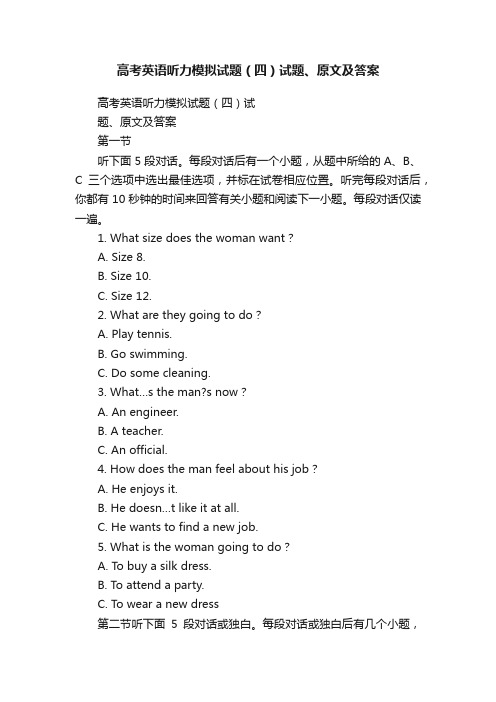
高考英语听力模拟试题(四)试题、原文及答案高考英语听力模拟试题(四)试题、原文及答案第一节听下面5段对话。
每段对话后有一个小题,从题中所给的A、B、C三个选项中选出最佳选项,并标在试卷相应位置。
听完每段对话后,你都有10秒钟的时间来回答有关小题和阅读下一小题。
每段对话仅读一遍。
1. What size does the woman want?A. Size 8.B. Size 10.C. Size 12.2. What are they going to do?A. Play tennis.B. Go swimming.C. Do some cleaning.3. What…s the man?s now?A. An engineer.B. A teacher.C. An official.4. How does the man feel about his job?A. He enjoys it.B. He doesn…t like it at all.C. He wants to find a new job.5. What is the woman going to do?A. To buy a silk dress.B. To attend a party.C. To wear a new dress第二节听下面5段对话或独白。
每段对话或独白后有几个小题,从题中所给的A、B、C三个选项中选出最佳选项,并标在试卷的相应位置。
听每段对话前,你将有时间阅读各个小题,每小题5秒钟;听完后,各小题将给出5秒钟的作答时间。
每段对话或独白读两遍。
听第6段材料,回答第6至7题。
6. Who is this announcement for?A. People on a train.B. People on a plane.C. People in a restaurant.7. What time of the day is it?A. Morning.B. Noon.C. Evening听第7段材料,回答第8至10题。
高考英语听力模拟试题(含原文和录音)
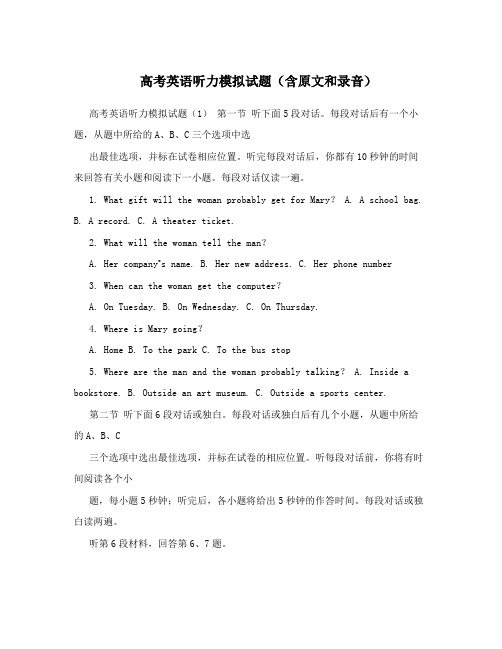
高考英语听力模拟试题(含原文和录音)高考英语听力模拟试题(1)第一节听下面5段对话。
每段对话后有一个小题,从题中所给的A、B、C三个选项中选出最佳选项,并标在试卷相应位置。
听完每段对话后,你都有10秒钟的时间来回答有关小题和阅读下一小题。
每段对话仅读一遍。
1. What gift will the woman probably get for Mary? A. A school bag.B. A record.C. A theater ticket.2. What will the woman tell the man?A. Her company‟s name.B. Her new address.C. Her phone number3. When can the woman get the computer?A. On Tuesday.B. On Wednesday.C. On Thursday.4. Where is Mary going?A. HomeB. To the parkC. To the bus stop5. Where are the man and the woman probably talking? A. Inside a bookstore. B. Outside an art museum. C. Outside a sports center.第二节听下面6段对话或独白。
每段对话或独白后有几个小题,从题中所给的A、B、C三个选项中选出最佳选项,并标在试卷的相应位置。
听每段对话前,你将有时间阅读各个小题,每小题5秒钟;听完后,各小题将给出5秒钟的作答时间。
每段对话或独白读两遍。
听第6段材料,回答第6、7题。
6. What sports does the man like to play after work? A. Table tennis, running and golf.B. Tennis, jogging and golf.C. Tennis, running and golf.7. How often does the man play golf?A. About once seven days.B. About once thirty days.C. About once a year.听第7段材料,回答第8、9题。
高考英语听力训练题第4套
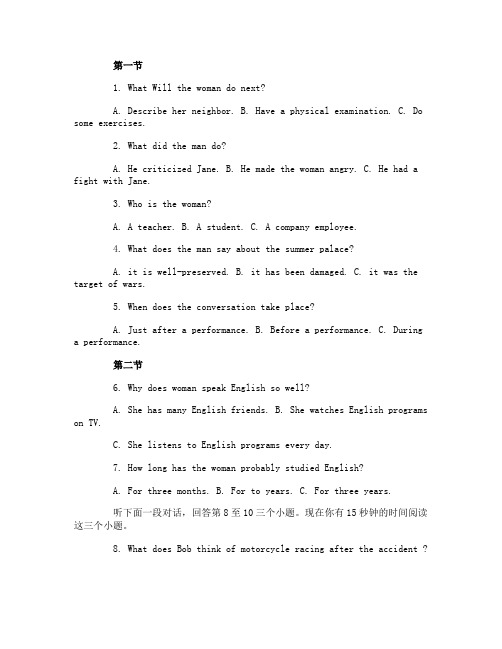
第一节1. What Will the woman do next?A. Describe her neighbor.B. Have a physical examination.C. Do some exercises.2. What did the man do?A. He criticized Jane.B. He made the woman angry.C. He had a fight with Jane.3. Who is the woman?A. A teacher.B. A student.C. A company employee.4. What does the man say about the summer palace?A. it is well-preserved.B. it has been damaged.C. it was the target of wars.5. When does the conversation take place?A. Just after a performance.B. Before a performance.C. During a performance.第二节6. Why does woman speak English so well?A. She has many English friends.B. She watches English programs on TV.C. She listens to English programs every day.7. How long has the woman probably studied English?A. For three months.B. For to years.C. For three years.听下面一段对话,回答第8至10三个小题。
现在你有15秒钟的时间阅读这三个小题。
精选题源听力 10套 原文+答案详解
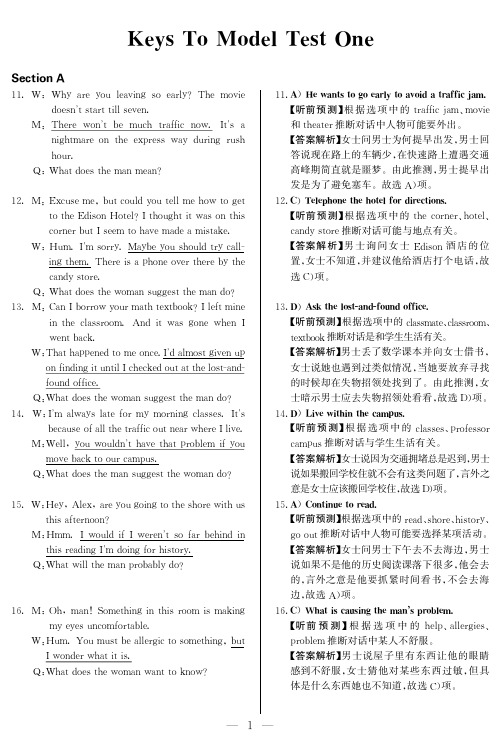
! " # $ % & ’(
" 1 ! ! "#! # $ ’ (% ) *+ ( & , . )( & ’ + $ (2 ) , ( %& /0 % 3 ) ( 0 . 4 5 0 5 & ’ 5 5 + + 0 ( , ( . " $ ( ’ (7 ) . 4 58 (2 * 9 $5 ’ & : : 9. ) 7"; 5 4 0& 6!1 . $ 5 2 & ’ () .5 $ (( < ’ ( 0 07 & * ’ . * 0 $ / = %3 /’ $ ) * ’ " " >!# $ & 5 3 ) ( 0 5 $ (2 & .2 ( & . ( ! A "6! B < 9 * 0 (2 ( 8 * 5 9 ) * + 3% ) *5 ( + +2 ($ ) 75 )/ ( 5 " 5 ) 5 $ (B 3 0 ) .C ) 5 ( +; 5 $ ) * $ 5 57 & 0) .5 $ 0 / 9 ) ’ . ( ’8 * 5 ; 0 ( ( 25 )$ & , (2 & 3 ( &2 0 5 & D ( " #!C * 2" ; 4 20 ) ’ ’ "6 & 8 (% ) *0 $ ) * + 35 ’ & + + E % % %9 . $ ( 2" 1 $ ( ’ ( 0&= $ ) . () , ( ’ 5 $ ( ’ (8 5 $ ( /5 % 9 & . 3 5 ) ’ ( " %0 " >!# $ & 5 3 ) ( 0 5 $ (7 ) 2 & .0 * ( 0 5 5 $ (2 & .3 ) / / "; ! G "6! F & . ; 8 ) ’ ’ ) 7% ) * ’2 & 5 $ 5 ( < 5 8 ) ) D + ( : 52 . ( .5 $ (9 + & 0 0 ’ ) ) 2"@ . 357 & 0/ ) . (7 $ ( .; 7 ( . 5 8 & 9 D " #! 1 $ & 5 $ & ( . ( 3 5 )2 ( ) . 9 ( " ; 4 3& + 2 ) 0 5 , ( .* = = = / ) . : . 3 . 5 * . 5 + ; 9 $ ( 9 D ( 3 ) * 5 & 5 5 $ ( + ) 0 5 E & . 3 E / : ) * . 3) : : 9 ( " " >! # $ & 5 3 ) ( 0 5 $ (7 ) 2 & .0 * ( 0 5 5 $ (2 & .3 ) / / ! I "#! ; 4 2& + 7 & 0+ & 5 (: ) ’2 ) ’ . . + & 0 0 ( 0 " ; 5 4 0 % %2 /9 8 ( 9 & * 0 () : & + + 5 $ ( 5 ’ & : : 9 ) * 5 . ( & ’7 $ ( ’ ( ; + , ( " ( 6! # ( + + ) *7 ) * + 3 . 4 5$ & , (5 $ & 5= ’ ) 8 + ( 2:% ) * % 2 ) , (8 & 9 D 5 )) * ’ 9 & 2 * 0 " = " >! # $ & 5 3 ) ( 0 5 $ (2 & .0 * ( 0 5 5 $ (7 ) 2 & .3 ) / / ( ( ! J "#! C ( @ + ( < & ’ ( ) */ ) . 5 ) 5 $ ( 0 $ ) ’ (7 5 $* 0 % % / " 5 $ 0 & : 5 ( ’ . ) ) . 6! C2 2" ;7 ) * + 3:;7 ( ’ ( . 4 50 ): & ’8 ( $ . 3. 5 $ 0 ’ ( & 3 . ; 4 23 ) . : ) ’$ 0 5 ) ’ " / / % " >! # $ & 57 + + 5 $ (2 & .= ’ ) 8 & 8 + ) %3 ! ! " -# . "/ 0 , * $ * & & " 0 2 ) * &0 3 & 4 (0 * 2 0 5 5 4 6 0 89 1 # 7 $ 听前预 测 % 根据选项中的5 ’ & : : 9? & 2& 2 ) , ( 和5 $ ( & 5 ( ’推断对话中人物可能要外出 ’ $ 答案解析% 女士问男士为何提早出发 ( 男士回 答说现在路上的车辆少 ( 在快速路上遭遇交通 高峰期简直就是噩梦’由此推测( 男士提早出 项’ 发是为了避免塞车’故选 @# # ! A " : % " ) " < & , " * < "< & * " ) 5 & 2( 4 2 " 6 * 4 & , $ 9 ; $ 听前 预 测 % 根 据 选 项 中 的5 & & $ (9 ) ’ . ( ’ $ ) 5 ( + 9 & . 3 5 ) ’ (推断对话可能与地点有关 ’ %0 $ 答案解 析 % 男士询问女士 B 3 0 ) .酒店的位 置( 女士不知道( 并建议他给酒店打个电话 ( 故 选F # 项’ ! G " =# $ > * < " ) & $ * ? 0 , ( ? 5 & @ , (& 5 5 4 6 " 9 $ 听前预测 % 根据选项中的9 & & + & 0 0 2 & 5 ( 9 + & 0 0 ’ ) ) 2 5 ( < 5 8 ) ) D推断对话是和学生生活有遇到过类似情况 ( 当她要放弃寻找 的时候却在失物招领处找到了 ’ 由此推测( 女 士暗示男士应去失物招领处看看 ( 故选 H# 项’ ! I " =# A 4 3 "/ 4 * < 4 , * < " 6 0 8 @ $ 9 ; $ 听前 预 测 % 根据选项中的9 & ’ ) : ( 0 0 ) ’ + & 0 0 ( 0 = 9 & 2 * 0推断对话与学生生活有关 ’ = 答案解析% 女士说因为交通拥堵总是迟到( 男士 $ 说如果搬回学校住就不会有这类问题了( 言外之 故选 H # 项’ 意是女士应该搬回学校住( ! J " -# : & , * 4 , @ " * & 2 " 0 ( 9 $ 听前预测% 根据选项中的’ & & & ( & 3 0 $ ) ’ ( $ 0 5 ) ’ % )) * 5推断对话中人物可能要选择某项活动 ’ / 答案解析% 女士问男士下午去不去海边 ( 男士 $ 说如果不是他的历史阅读课落下很多 ( 他会去 言外之意是他要抓紧时间看书 ( 不会去海 的( 边( 故选 @# 项’ (2 )M ! K "6! L $ & . ) 2 ( 5 $ . .5 $ 0’ ) ) 202 & D . // 2 ( 0* . 9 ) 2 : ) ’ 5 & 8 + ( " %( % ( #! C * 2" N ) *2 * 0 5 8 ( & + + ( ’ 9 5 ) 0 ) 2 ( 5 $ . 8 * 5 / / ;7 ) . 3 ( ’7 $ & 5 5 0 " >! # $ & 5 3 ) ( 0 5 $ (7 ) 2 & .7 & . 5 5 )D . ) 7" #B ! K " : < 0 * 4 $ 6 0 @ $ 4 , * < "8 0 , C $ 2 & D ) " 89 1 ; $ 听前 预 测 % 根据选项中的 $ & & ( + & + + ( ’ ( 0 = / ’ ) 8 + ( 2 推断对话中某人不舒服 ’ = $ 答案解析% 男士说屋子里有东西让他的眼睛 感到不舒服( 女士猜他对某些东西过敏 ( 但具 体是什么东西她也不知道 ( 故选 F # 项’
高中英语听力题第四套题
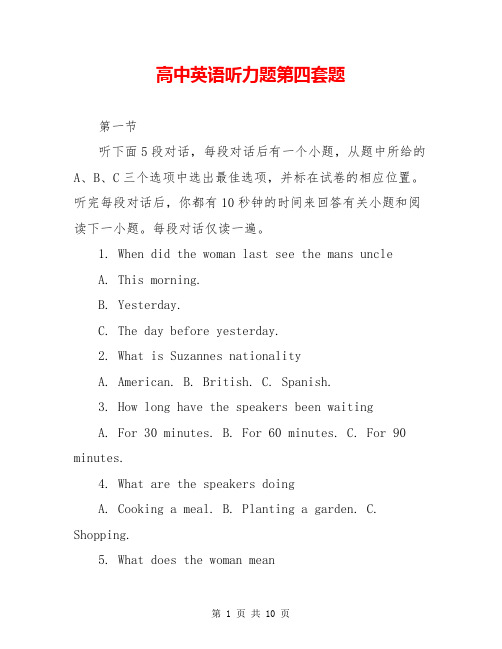
高中英语听力题第四套题第一节听下面5段对话,每段对话后有一个小题,从题中所给的A、B、C三个选项中选出最佳选项,并标在试卷的相应位置。
听完每段对话后,你都有10秒钟的时间来回答有关小题和阅读下一小题。
每段对话仅读一遍。
1. When did the woman last see the mans uncleA. This morning.B. Yesterday.C. The day before yesterday.2. What is Suzannes nationalityA. American.B. British.C. Spanish.3. How long have the speakers been waitingA. For 30 minutes.B. For 60 minutes.C. For 90 minutes.4. What are the speakers doingA. Cooking a meal.B. Planting a garden.C. Shopping.5. What does the woman meanA. She didnt have a vacation.B. She liked her vacation very much.C. She didnt enjoy her holiday.第二节听下面5段对话或独白,每段对话或独白后有几个小题,从题中所给的A、B、C三个选项中选出最佳选项,并标在试卷的相应位置。
听每段对话或独白前,你将有时间阅读各个小题,每小题5秒钟;听完后,各小题将给出5秒钟的作答时间。
每段对话或独白读两遍。
听第6段材料,回答第6-8题。
6. Where did Mary use to workA. In a factory.B. In a pany.C. In a law firm.7. When did Mary change her jobA. Two months ago.B. One month ago.C. One week ago.8. What will the woman do this SaturdayA. Work overtime.B. Visit the man.C. Chat online.听第7段材料,回答第9至11题。
高考英语真模拟听力材料四 试题
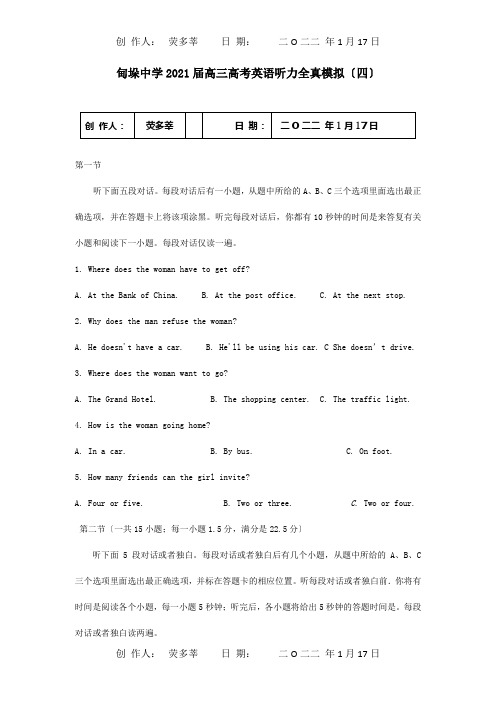
甸垛中学2021届高三高考英语听力全真模拟〔四〕第一节听下面五段对话。
每段对话后有一小题,从题中所给的A、B、C三个选项里面选出最正确选项,并在答题卡上将该项涂黑。
听完每段对话后,你都有10秒钟的时间是来答复有关小题和阅读下一小题。
每段对话仅读一遍。
1. Where does the woman have to get off?A. At the Bank of China.B. At the post office.C. At the next stop.2. Why does the man refuse the woman?A. He doesn't have a car.B. He'll be using his car. C She doesn’t drive.3. Where does the woman want to go?A. The Grand Hotel.B. The shopping center.C. The traffic light.4. How is the woman going home?A. In a car.B. By bus.C. On foot.5. How many friends can the girl invite?A. Four or five.B. Two or three.C. Two or four. 第二节〔一共15小题;每一小题1.5分,满分是22.5分〕听下面5段对话或者独白。
每段对话或者独白后有几个小题,从题中所给的A、B、C 三个选项里面选出最正确选项,并标在答题卡的相应位置。
听每段对话或者独白前.你将有时间是阅读各个小题,每一小题5秒钟;听完后,各小题将给出5秒钟的答题时间是。
每段对话或者独白读两遍。
听第6段材料,答复第6—7题。
6. What are the speakers going to do this weekend?A. Go to the beach.B. Climb a mountain.C. Go for a bicycle-ride.7. What do we know about Paul and Mary?A. They might be the speakers' friends.B. They've decided to join the speakers.C. They did some riding yesterday.听第7段材料,答复第8-10题。
高考复习阶段听力练习题份
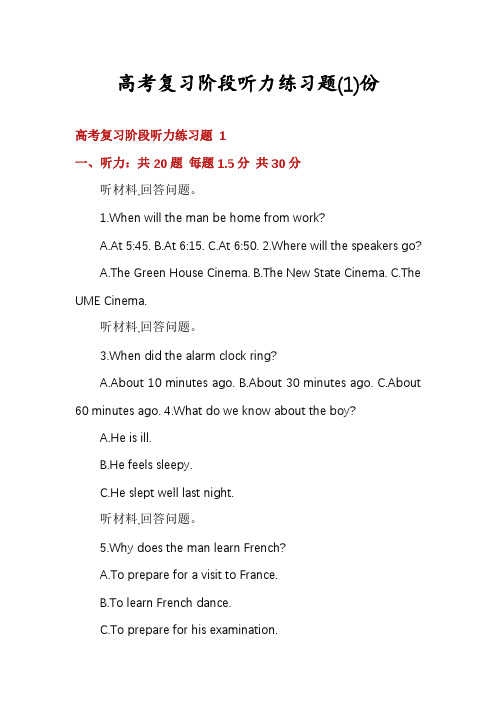
高考复习阶段听力练习题(1)份高考复习阶段听力练习题 1一、听力:共20题每题1.5分共30分听材料,回答问题。
1.When will the man be home from work?A.At 5:45.B.At 6:15.C.At 6:50. 2.Where will the speakers go?A.The Green House Cinema.B.The New State Cinema.C.The UME Cinema.听材料,回答问题。
3.When did the alarm clock ring?A.About 10 minutes ago.B.About 30 minutes ago.C.About60 minutes ago. 4.What do we know about the boy?A.He is ill.B.He feels sleepy.C.He slept well last night.听材料,回答问题。
5.Why does the man learn French?A.To prepare for a visit to France.B.To learn French dance.C.To prepare for his examination.6.What is the woman going to do according to the dialogue?A.To see a doctor.B.To have ballet lessons.C.To see a movie. Listen carefully and then choose the best answer for each question.7.What did the man buy?A.A house.B.Some plants.C.Both a house and some plants.8.What can be inferred about the woman’s house?A.There is no sunlight in her house.B.There is a lot sunlight in her house.C.There is not enough sunlight in her house.听材料,回答问题。
全国英语高考试卷听力
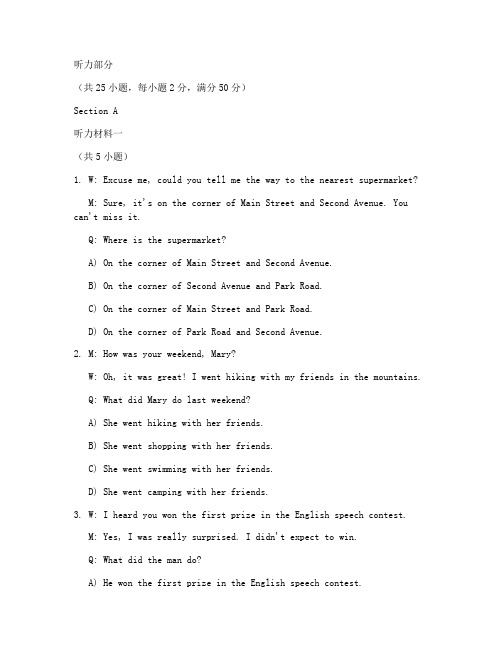
听力部分(共25小题,每小题2分,满分50分)Section A听力材料一(共5小题)1. W: Excuse me, could you tell me the way to the nearest supermarket?M: Sure, it's on the corner of Main Street and Second Avenue. You can't miss it.Q: Where is the supermarket?A) On the corner of Main Street and Second Avenue.B) On the corner of Second Avenue and Park Road.C) On the corner of Main Street and Park Road.D) On the corner of Park Road and Second Avenue.2. M: How was your weekend, Mary?W: Oh, it was great! I went hiking with my friends in the mountains. Q: What did Mary do last weekend?A) She went hiking with her friends.B) She went shopping with her friends.C) She went swimming with her friends.D) She went camping with her friends.3. W: I heard you won the first prize in the English speech contest.M: Yes, I was really surprised. I didn't expect to win.Q: What did the man do?A) He won the first prize in the English speech contest.B) He lost in the English speech contest.C) He didn't participate in the English speech contest.D) He didn't win the English speech contest.4. M: I can't find my book. Do you know where it is?W: Oh, I saw it on your desk this morning.Q: What can we infer from the conversation?A) The man is looking for his book.B) The woman knows where the book is.C) The book is on the woman's desk.D) The book is lost forever.5. W: Can I help you with anything, sir?M: Yes, I need a pair of jeans that fit me well.Q: What is the man looking for?A) A pair of jeans.B) A pair of shoes.C) A pair of socks.D) A pair of gloves.听力材料二(共5小题)6. W: I'm planning a trip to Japan this summer. Do you have any suggestions?M: Well, you should definitely visit Tokyo and Kyoto. They are both beautiful cities.Q: What does the man suggest the woman do?A) Visit Tokyo and Kyoto.B) Go to the beach.C) Explore nature.D) Learn Japanese.7. M: I'm thinking of buying a new car. Do you have any recommendations?W: I would recommend a hybrid car. They are eco-friendly and save money on gas.Q: What does the woman recommend the man buy?A) A hybrid car.B) A gas-powered car.C) A used car.D) A luxury car.8. W: I heard you want to learn a new language. Have you started yet?M: Yes, I've started learning Spanish. It's fun and useful.Q: What is the man doing?A) Learning Spanish.B) Learning English.C) Learning French.D) Learning German.9. M: I'm planning to travel to Italy next month. Any advice on what to see?W: Definitely visit the Colosseum and the Vatican. They are iconic landmarks.Q: What does the woman suggest the man visit?A) The Colosseum and the Vatican.B) The Eiffel Tower and the Louvre.C) The Great Wall and the Forbidden City.D) The Statue of Liberty and the Empire State Building.10. W: I'm looking for a new hobby. Do you have any suggestions?M: How about taking up painting? It's relaxing and you can express yourself.Q: What does the man suggest the woman do?A) Take up painting.B) Take up cooking.C) Take up gardening.D) Take up dancing.Section B听力材料三(共5小题)11. W: Have you heard about the new restaurant downtown?M: Yes, I've heard it's very popular. They serve delicious Italian food.Q: What does the man think about the new restaurant?A) It's not popular.B) It serves Italian food.C) It's not downtown.D) It's not new.12. W: I'm planning to buy a new laptop. Do you have any suggestions?M: I would recommend the MacBook Pro. It's known for its high performance and long battery life.Q: What does the man suggest the woman buy?A) A MacBook Pro.B) A Windows laptop.C) A Chromebook.D) A Linux laptop.13. W: I'm thinking of taking up running. Do you have any tips?M: Start slow and gradually increase your distance. It's important to warm up and cool down properly.Q: What does the man advise the woman to do?A) Start running fast.B) Increase her distance quickly.C) Warm up and cool down.D) Take running breaks.14. W: I'm trying to improve my English speaking skills. Do you have any suggestions?M: Practice speaking with native speakers. It will help you improve your pronunciation and fluency.Q: What does the man suggest the woman do?A) Practice speaking with native speakers.B) Read English books.C) Watch English movies.D) Learn English grammar.15. W: I'm planning to go hiking this weekend. Do you have any tips?M: Pack enough water and snacks. It's important to stay hydrated and energized.Q: What does the man advise the woman to do?A) Pack enough water and snacks.B) Hike fast.C) Take short breaks.D) Hike alone.Section C听力材料四(共5小题)16. W: Have you heard about the new research on climate change?M: Yes, it's concerning. The report says that global temperatures are rising at an alarming rate.Q: What does the man think about the new research?A) It's reassuring.B) It's concerning.C) It's irrelevant.D) It's exaggerated.17. W: I'm worried about the future of our planet. What can we do to help?M: We can start by reducing our carbon footprint. Using public transportation and recycling are good steps.Q: What does the man suggest we do?A) Use public transportation.B) Recycle.D) Drive cars.18. W: I heard that the government is planning to invest in renewable energy.M: That's great news. It will help us reduce our reliance on fossil fuels and protect the environment.Q: What does the man think about the government's plan?A) It's bad news.B) It's great news.C) It's unnecessary.D) It's too expensive.19. W: I'm worried about the impact of plastic pollution on marine life.M: We need to take action. Recycling and using biodegradable materials can help reduce plastic waste.Q: What does the man suggest we do?A) Recycle.B) Use biodegradable materials.C) Both A and B.D) Use more plastic.20. W: I heard that deforestation is a big problem in many countries.M: That's true. We need to protect forests and plant more trees to combat climate change.Q: What does the man suggest we do?A) Protect forests.B) Plant more trees.D) Cut down more trees.。
高考听音模拟试题
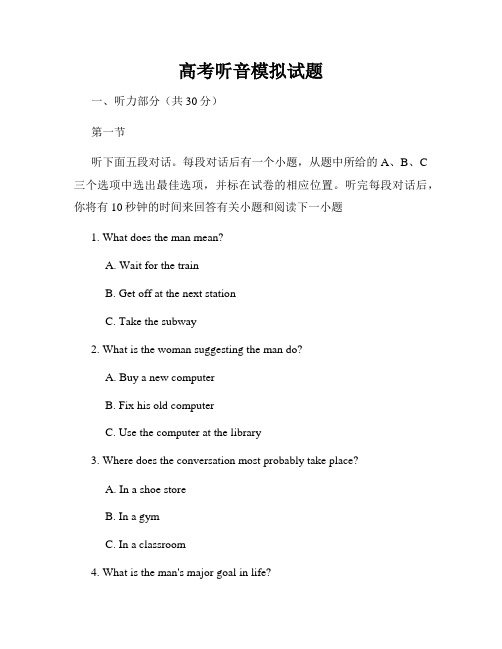
高考听音模拟试题一、听力部分(共30分)第一节听下面五段对话。
每段对话后有一个小题,从题中所给的A、B、C 三个选项中选出最佳选项,并标在试卷的相应位置。
听完每段对话后,你将有10秒钟的时间来回答有关小题和阅读下一小题1. What does the man mean?A. Wait for the trainB. Get off at the next stationC. Take the subway2. What is the woman suggesting the man do?A. Buy a new computerB. Fix his old computerC. Use the computer at the library3. Where does the conversation most probably take place?A. In a shoe storeB. In a gymC. In a classroom4. What is the man's major goal in life?A. To be a good teacherB. To be a successful businessmanC. To be a great writer5. What does the man say about the woman?A. She's lucky not to pay the fineB. She's afraid of getting a speeding ticketC. She needs a new driving license第二节听下面五段对话或独白。
每段对话或独白后有几个小题,从题中所给的A、B、C三个选项中选出最佳选项,并标在试卷的相应位置。
听每段对话或独白前,你将有时间阅读各个小题,每小题5秒钟。
听完后,每小题将给出5秒钟的作答时间。
- 1、下载文档前请自行甄别文档内容的完整性,平台不提供额外的编辑、内容补充、找答案等附加服务。
- 2、"仅部分预览"的文档,不可在线预览部分如存在完整性等问题,可反馈申请退款(可完整预览的文档不适用该条件!)。
- 3、如文档侵犯您的权益,请联系客服反馈,我们会尽快为您处理(人工客服工作时间:9:00-18:30)。
英语听力练习材料04第一节1.Where is Jimmy now?A.At a hotel.B.At home.C.At the lab.2. What is the man?A.A waiter.B.A taxi driver.C.A conductor.3.What does the man think of Yao Ming?A.He is the tallest basketball player in the world.B.He is famous all over the world.C.He is only well known in China.4.What will the woman do for the man?A.Wash his clothes.B.Take him to the supermarket.C.Get him some fruit.5.Why couldn’t the woman get through to the man?A.His mobile was stolen.B.His mobile didn’t work.C.His mobile was power off.第二节听下面5段对话或独白。
每段对话或独白后有几个小题,从题中所给的A、B、C三个选项中选出最佳选项,并标在试卷的相应位置。
听每段对话或独白前,你将有时间阅读各个小题,每小题5秒钟;听完后,各小题将给出5秒钟的作答时间。
每段对话或独白读两遍。
听第6段材料,回答第6至7题。
6.Who did Fred have a fight with last night?A.His brother.B.The policeman.C.The storekeeper.7.What can we learn from the conversation?A.Fred was slightly hurt.B.The car was moved away by the policemen.C.The drugstore was destroyed by Fred.听第7段材料,回答第8至10题。
8.What do we learn about the couple?A.They are on vacation.B.The wife doesn’t like to travel.C.They went on a trip last year .9.How long does the trip in the advertisement take?A.10 days.B.Two weeks.C.21 days.10.Why doesn’t the wife like the trip?A.She doesn’t like to live on the ship.B.She prefers to stay in one place.C.She doesn’t like the food.听第8段材料,回答第11至13题。
11.Why is the woman so happy?A.She started carrying a credit card.B.She got an ID card of her own.C.She’s got some money belonging to her.12.What advice does the man give the woman?A.She must have enough money with her.B.She should not buy everything she wants.C.She must care about her credit card and ID card.13.How much can the woman spend at most with her credit card?A.500.B.1,500.C.50.听第9段材料,回答第14至16题。
14.What does the man make the phone call for?A.He wants to make a reservation.B.He wants to build a penthouse.C.He wants to get some books.15.Who is Tony Parker?A.The person who handles bookings for standard rooms.B.The person who makes all the arrangements for executive accounts.C.The person who manages the hotel.16.What is the man’s phone number?A.6608433233.B.6608433235.C.6608433230.听第10段材料,回答第17至20题。
17.How did the writer get back to Vancouver?A.By train.B.By air. C .By sea.18.According to the text,what do you think the writer is?A.She is an artist.B.She is a teacher.C.She is a student.19.How long did the writer stay in Canada?A.A week.B.Two weeks.C.A month.20.Who did the writer me et on the train?A.She met an American woman.B.She met a Chinese woman.C.She met an Indian woman.英语听力练习材料06第一节(共5小题)听下面5段对话。
每段对话后有一个小题,从题中所给的A、B、C三个选项中选出最佳选项,并标在试卷的相应位置。
听完每段对话后,你都有10秒钟的时间来回答有关小题和阅读下一小题。
每段对话仅读一遍。
1.What do we learn about the woman from this conversation?A.She plans to send out all the invitations.B.She’s a new student.C.She thinks the man is right.2.What does the man mean?A.He didn’t know which hospital Bill was in.B.He took Bill to the hospital.C.He forgot to call the woman.3.What does the woman mean?A.She hasn’t heard from the professor in a week.B.The class has extra time to complete the assignment.C.She only just found out about the economics paper.4.What does the woman mean?A.The doctor has stopped seeing new patients.B.T he doctor’s clinic will be closed tomorrow.C.The doctor’s schedule is filled tomorrow.5. What does the woman want to know?A.Where the meeting is being held.B.Where Joe will meet her.C.What the topic of the meeting is.第二节(共15小题)听下面5段对话或独白。
每段对话或独白后有几个小题,从题中所给的A、B、C三个选项中选出最佳选项,并标在试卷的相应位置。
听每段对话或独白前,你将有时间阅读各个小题,每小题5秒钟;听完后,各小题将给出5秒钟的作答时间。
每段对话或独白读两遍。
听第6段材料,回答第6至8题。
6. What does the man want to do?A.To have his shoes mended.B.To buy a pair of new shoes.C.To do shopping in a supermarket.7. How far is the supermarket?A.Two blocks away.B.Five blocks away.C.Six blocks away.8.How will the man go to the place?A.By bus.B.On foot.C.In his car.听第7段材料,回答第9至11题。
9.What’s the relationship between the two speakers?A.Secretary and boss.B.Teacher and student.C.Doctor and patient.10. Why was she late?A.Her aunt called her to get up late.B.She miss ed the bus.C.She got a telephone call.11.What can we know about the teacher?A.He is strict with his students.B.He is cold to his students.C.He gets angry easily.听第8段材料,回答第12至14题。
12.Where does the conversation take place?A.In a company.B.In a factory.C.In a hospital.13. Why can’t the woman sleep well?A.Because she has been working too hard.B.Because she has a family problem.C.Because she has a high fever.14. What does the doctor suggest that the woman should do?A.She should take some medicine.B.She should take holidays.C.She should change a job.听第9段材料,回答第15至17题。
